#because the kids have no lore no life and no relevance to the actual story.
Text
I think it's funny whenever people harp on about how "oh well Harley killed those kids so she's irredeemable!" In regards to that one random Detective Comics issue when like, honey, we didn't even know those drawings. They're literally nameless colors and shapes on a page.
Am I supposed to care? Because I don't. I really, really don't.
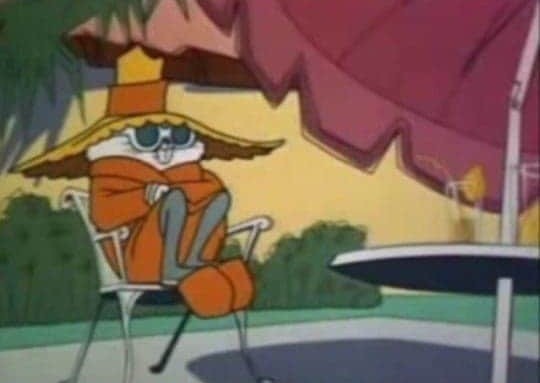
#maybe the kids were little fucks who deserved it who knows#not us and certainly not the folks using it as an arguing point lol#because the kids have no lore no life and no relevance to the actual story.#its almost like fictional characters kill other fictional characters who exist solely for the purpose to die at their hands#and that doesn't really make the criminal character on par with ya know#ACTUAL FUCKING MURDERERS IRL#they're fictional characters#and the colors she killed didn't feel anything i promise yall are more pressed about this than they are#people love saying they prefer villain harley and then turn around and bitch about the previous villain shit she's done#make up your mind#harley quinn#harleen quinzel#dc comics#I support ALL of Harley's choices and arcs 💖 its called enjoying a character arc.
11 notes
·
View notes
Text
It's interesting how the game never calls Bi-Han a "traitor". Sure, some of the characters do, but the game itself never refers to him that way.
One of his gear pieces is called "Wayward Son" and that is what he is, someone who strayed from the right path and lost himself in his own ambition. He made one wrong choice, one he regrets, if you listen closely to his intros with some characters, like Shang Tsung or Kitana, and it's ridiculous how certain people try and write him off as an evil turncoat who is lost beyond redemption. Liu Kang will try and (at least partially) succeed at bringing him back to the light. I don't get why people are trying to deny Bi-Han any character development and pin him to that one mistake he made or force the traitor role onto him when that's never who he was to begin with.
Bi-Han is the one getting betrayed, constantly, throughout his life. His father kept secrets from him, his brothers turn their backs on him when all he wanted was for them to be part of the future he envisioned for their clan. Even Frost wants to eclipse him and will undoubtedly betray him at some point. His own allies want to kill him after he helped them escape from captivity. Bi-Han has no one he can trust. He's entirely on his own. That may be his own fault to some extent, but I genuinely can't understand how people can be so blind to his suffering or worse, want to see him suffer even more? He's already bearing the consequences of his actions and it's painful to witness.
To get back to the point I made in the beginning, has anyone else noticed how the invasions mode nodes and encounters also never call Bi-Han a traitor or anything of the likes? I've seen Tanya's nodes and even some of her seasonal skins referencing her betrayal in previous timelines, even if nothing hints at her being a traitor this time around. In Bi-Han's encounters, the game only calls him "Ice Fighter", "Chill Initiate", "Snowfall Brother" or "Matchless Cryomancer", always refering to two things, Bi-Han's skills and his affiliation with the cold. That is who he is and always was. A cold, ruthless fighter. That hasn't changed in the current timeline and it makes no sense how some fans claim he was ruined because he made one bad decision.
When equipping Johnny as the announcer voice, the most negative thing he has to say about Bi-Han is that he's bossy, as opposed to how he speaks of actual villains like Shang Tsung ("Hate this guy" etc.). There are no references to his supposed "betrayal" which is why I believe it's only going to be a small part at the very beginning of his character arc that won't hold much relevance for the future, especially as the story develops more, except to serve as a reason for Kuai Liang and him to be enemies.
The way the game speaks of Bi-Han always sounds bittersweet to me and so do the names of his skins/gear pieces. It's almost like a parent talking to or about a stubborn kid that won't take their advice. One of my favorite examples is the kombat league skin that was added this season named "It's cold outside, Bi-Han". It reminded me of Liu Kang telling Bi-Han to "come in from the cold" and I think it's heart wrenchingly beautiful how even outside of the story mode and intros the tragedy that is Bi-Han's story is being acknowledged by the game through all those small subtle references.
One could argue that I'm reading too much into these details but I think some of you don't do that enough. There's 20+ characters on the main roster, the story would have to be dozens of hours long to give all of them in depth background stories and fully flesh them out so we can empathize with their motives. It's hard to understand Bi-Han's character unless you start looking at these small bits and pieces of lore and unfortunately, not enough people do that.
112 notes
·
View notes
Note
Do u want to talk abt ur ocs..... I actually followed you initially bc they seemed so interesting and silly and I want to know more if you feel like sharing :)
I still can’t believe some ppl follow me for my ocs bc it’s usually for my fanart so this is really nice to hear! I have a couple stories/universes but the main one I’ve been…developing (it’s on and off) since I was like 13/14 is about these two kids named Keiko and Rolin!! Im still doing a lot of world and lore building but the main gist is that Rolin is a teenage boy turning 16 who returns to his hometown to live with his aunt and meets a strange young girl named Keiko (debating on making her 10-12 idk she was originally 10). I won’t go too much into like Lore stuff but she has like..my own version of clairvoyance. They are kind of opposites, with Rolin being introverted and jaded, and Keiko being loud and optimistic but they are both silly.
I think it’s been said before but the whole driving relationship of the story is the two of them going on adventures throughout the city and solving mysteries while simultaneously becoming family and finding a real home within each other and the people they’ve met and learned to love 😚
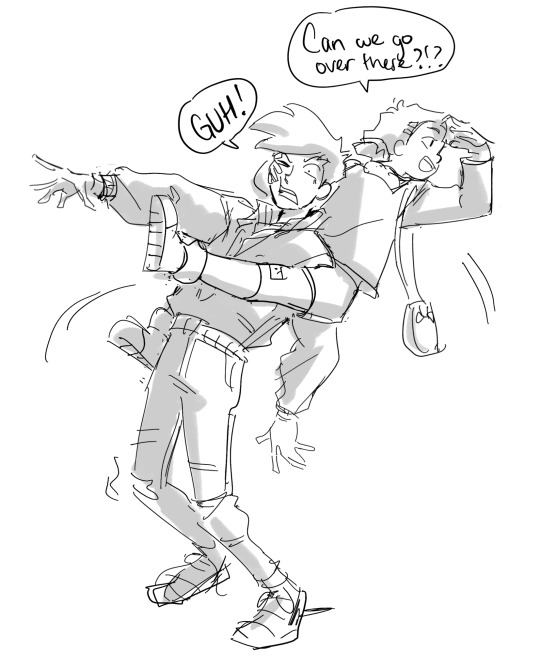
Now the story is centered around Rolin and Keiko, but a big focus is on the cast of characters that fill mostly Rolins life. Mira and Artie were friends with Rolin when they were kids before Rolin left with his mom, and all three grew up and have been living their own lives, but when Rolin comes back they get a chance to reconnect (with Keiko’s help). Valoryn (Val) is also new in town, and befriends Rolin and Keiko. This is just a messy fast doodle of them I have better art in my oc tags🙏
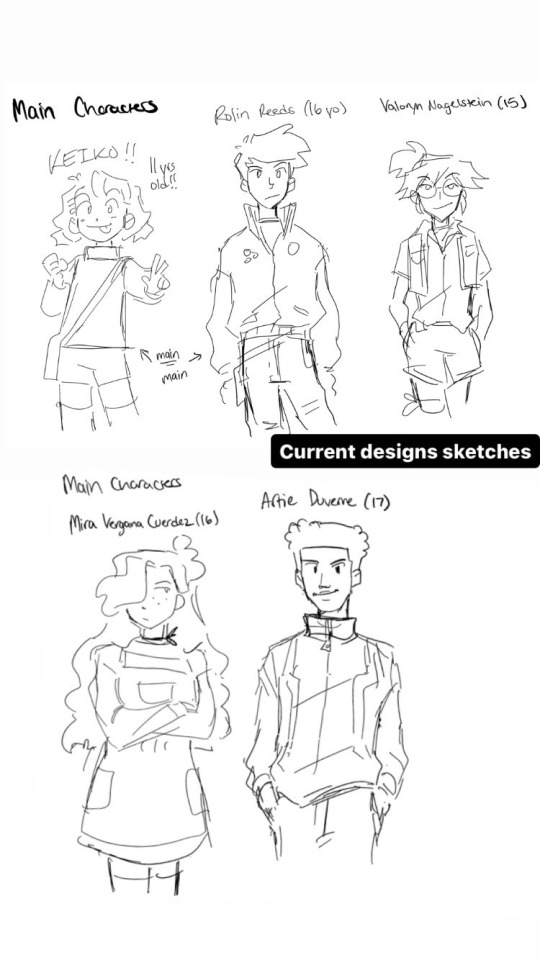
Some old sketches
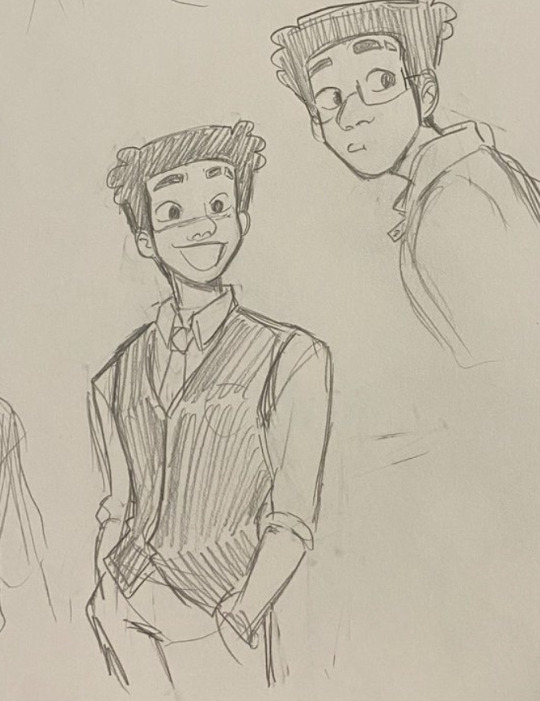

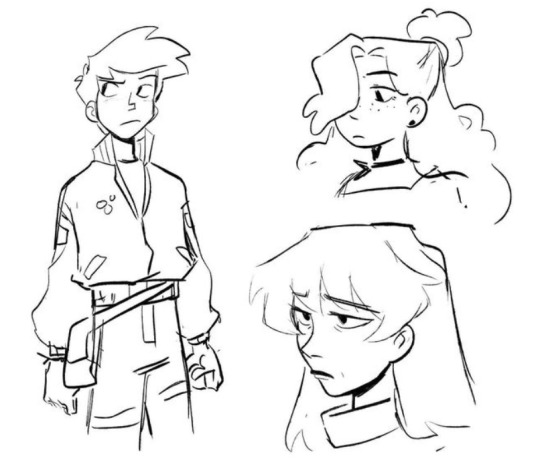
The other major cast is Rolin’s family, and Rolin has always been Asian so as I worked on the story his family kept getting more and more relevant especially with a major theme of the story being about the connections you have with people in your life so like I can’t leave them out. And I’ve never settled on an Asian ethnicity until recently where I was like I might as well make him Filipino so I can base his family off my own🫡 Cousins (both blood and not) that are years older than you but treat you like siblings and give u silly nicknames 🫶


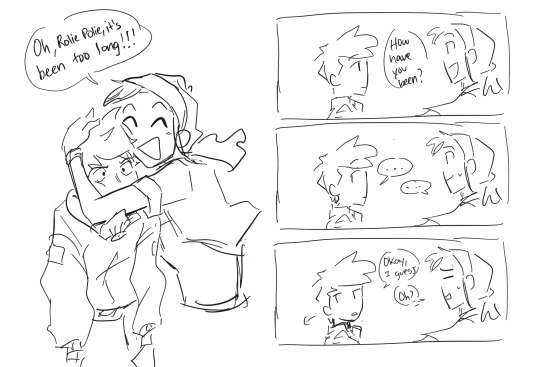

Now Diana (or Deedee) is one of those characters I’ve had for a long time, and I made her because I liked those laidback mentor figures in anime (like Qrow from rwby) and wanted a laidback lady one 🤷🏻♀️ she also has some Misato from nge influence. She has always been written to be a mentor figure to Rolin and Keiko, and at one point I think I was going to make her his actual aunt but stuck to her being just a cousin so I could write about her relationship with her mom 🫶 Unlike her brother Darius, she does not live with her mom and Rolin has to go out of his way to meet her.

And Rolin’s parents’ story aren’t the main focus (they aren’t really present themselves in the main story) and it’s mostly just flashback stuff but they r silly and sad and I love drawing them 😼
I could go into more detail but that’s an overview of some of the characters
67 notes
·
View notes
Text


share ur well lore headcanons bro (via @crowdemon-boyo)
so this is actually something I already threatened to write about…a year ago: And I touched upon it a little (not required reading for this post but some more lore) but I didn’t really expand because it is one of my most unhinged izombie tangents.
As in, we're way down here, playing with the weird kids:

Before I get into this, I want to go on a VERY brief excursion about wells and their symbolic meaning(s). There is going to be a lot of talk about mythology and symbolism and parallels etc and if interrupt my later explanations every time to introduce one of these themes, it's probably going to feel a lot more hamfisted than it is AND be a lot harder to follow. Feel free to skip this part because I will keep the second part comprehensible for those who didn't read it - but also, I read up on wells for this and it's my post so I will talk about wells.
Wells
In short, wells had great importance for any civilisation throughout history – because wells were where people got water! And without water, there is no food, no drink, no livestock, no washing, no harvest - in short, no civlisation. So wells also found a way into many mythologies with a lot of different meanings. But wells can also hold dangers – like falling into them or the problems of wells turning bad or mosquitos and the diseases they spread (diseases that people likely didn't know were caused by mosquitos). And these dangers also found their way into myths and stories (especially because people couldn't explain many of these things).
Generally, the mythological symbolism of wells is very old and spread across many cultures - e.g., our tradition of throwing coins into fountains and wells likely stems from the tradition of giving sacrifices to the spirits/gods/nymphs looking after the well, keeping it clean and healthy and making sure the people have enough water. (One theory being that the biocidal qualities of copper and silver in the coin would help prevent bacterial infections - and that this effect would be attributed to the well-spirits accepting the sacrifices and creating healthier water!)
There are a few different core themes regarding wells:
health/fertility/long-levity/immortality/life/growth and transformation (I mention this one because it is a very important one, but off the bat: It’s also not really important for the purposes of this analysis. An example of this can be found in old Christian beliefs, where certain wells were believed to have sacred healing abilities and were the destination for pilgrims seeking relief from their ailments. One region where this is particularly relevant is the southwest of Ireland.)
wisdom/knowledge/prophecy/divination (this, e.g. can be found in Norse mythology very famously with the well of Mimir, where Odin pays with his eyes the price for all knowledge)
death/source of evil/connection to the underworld.In Greek mythology, wells and springs are associated with the Naiads, the nymphs. They personified the well and were worshipped for it - but they weren't always benevolent. For example, a very famous story is that of the lover of Hercules, Hylas, who dropped his pitcher into a well - and the Naiads fell in love with him and dragged him in. Another mythology where wells and magical ponds and fountains play a huge role is Irish mythology (which works nicely bc the McDonough family very likely have Gaelic roots, considering that Blaine and Angus both are Gaelic names and McDonough is also Gaelic). One example from Irish mythology are these stories from the Dindshenchas:
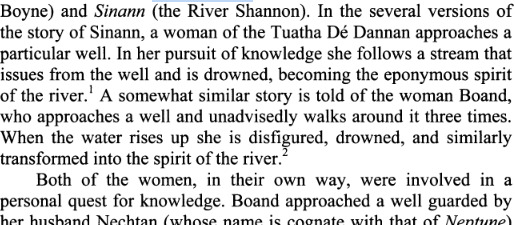

These themes also have had a big impact on literature and media staples and wells as a source of evil also appear often, like we see in The Ring.
Personally, I would argue that these categories are not distinctly separate - and that not all appearances of wells fall into these three categories at all. They're just very common. Another personal leap I would like to make is that not all the deaths associated with wells are addressing the mysteries of disease or the dangers of accidents (like in the case of Hylas who dropped his pitcher) or dealing with them. I also think there might be an association with wells/rivers/waters and suicide. The reason I believe that is the attraction of the well (Narcissus) and the number of tales of people (especially women) being turned into wells as a means of protection from duress in the earthly realm - it's not just accidents:
According to Pausanias, Alpheius was a passionate hunter and fell in love with the nymph Arethusa, but she fled from him to the island of Ortygia near Syracuse, and metamorphosed herself into a well, whereupon Alpheius became a river, which flowing from Peloponnesus under the sea to Ortygia, there united its waters with those of the well Arethusa. This story is related somewhat differently by Ovid. Arethusa, a fair nymph, once while bathing in the river Alpheius in Arcadia, was surprised and pursued by the god; but Artemis took pity upon her and changed her into a well, which flowed under the earth to the island of Ortygia."[8]
This is something that appears in other stories too - and you will notice that it also happens in the stories of Sinann und Boand: The well is specifically sought out with lethal consequences.
There is another, very historical reason why myths about wells and the fae and mythological creatures associated with them have taken on a darker connotation: Christianisation. A lot of pagan traditions would later be villainised, usually by associating them with demons or devils and demons. An example of this is a tale like that of Melusine. Originally, the stories of Melusine (a nixie, a Germanic female water/well spirit who in this case is half-woman, half water-serpent) and her mother were about how a human men fell in love with them and they would set conditions and boundaries to being with them - that they wouldn't see them in their natural non-human states. Something that their male partners would ignore, meaning that they spied on them in vulnerable states such as when they were bathing or nursing or birthing - leading to the water-spirits abandoning them. This is another very common theme to all these kinds of fae-stories: The creatures of the other realm might give you something (in this case, marry the human suitor) but there are always conditions and contracts attached - and if you violate them, your situation will usually be worse than before.
But Christian interpretation changed these stories. For example, Martin Luther mentions a new version of the story (which he believed in) where Melusine was actually the devil or a succubus, taking on a seductive shape to corrupt me. In this version of the tale, "a young man meets a beautiful woman named Melusina who has the lower body of a snake. If he will kiss her three times on three consecutive days, she will be freed. However, on each day she becomes more and more monstrous until the young man flees in terror without giving her the final kisses. He later marries another girl, but the food at their wedding feast is mysteriously poisoned with serpent venom and everyone who eats it dies."
this is another huge aspect of well-related horror and symbolism, the idea of a slow-working, consuming poison that takes and takes and depletes you - another famous example of this is H.P. Lovecraft's where a poisoned well kills an entire family, farm and surroundings: "Nahum said somethin’ lived in the well that sucks your life out. [...] Nahum thought it feeds on everything livin’ an’ gits stronger all the time." (Actually, Lovecraft, who really liked lending from old myth, also writes this in the Case of Charles Dexter Ward which reminds me a lot of Blaine's final fate: "The torch shook in his hand, but he looked again to see what manner of living creature might be immured there in the darkness of that unnatural well; left starving by young Ward through all the long month since the doctors had taken him away,"
I'm sure you can't wait to see how all of this is gonna be relevant in the context of the zombie-crime show.
The Well on iZombie
Time to subject you to the original point of this entire enterprise here:
The McDonough family
So I'm going to start with a quick re-cap of the canon well-lore on iZombie. We know the McDonough family is very rich and has a pretty big estate - which happens to have a well on it.
They are introduced with a very strong focus on the paternal line in three generations: The grandfather (I don't think he was named), Angus, and then Blaine himself. The original wealth of the family mostly seems to come from the business the grandfather built until he was finally usurped by Angus, who took over his business and whose main goal seems to be to accomplish even more and attain more wealth - but who, unlike his father, seems to have very little interest of actually being loved by his family.
There is also Angus' wife/Blaine's mother, who also goes unnamed and we never get a reliable account of her story, with most things about her being told from the point of view of Angus, often with the deliberate intent to attack Blaine, and sometimes by Blaine in order to confront his father. What we do know is that this relationship is very abusive and ended with Blaine's mother taking her own life when he was still a child. In a way, this also seems to be true of Blaine's grandfather, who we only know from Angus' and Blaine's accounts (with Angus being disgusted with his father for being fond of Blaine and treating him well ('babying him'), and Blaine clearly loving his grandfather a lot, even taking care of him all these years but finally sacrificing him for revenge against his father).
For the most part, Angus seems to be obsessed with attaining more power and more wealth - and believes cruelty, hardness, and remorselessness to be the only means to accomplish that. While he has some appreciation for the finer things in life (mostly wealth but also things that emphasise his own grandeur - Major once points out that Angus owns a bust of himself), one thing he resents about the rest of his family is their supposed 'softness' (in the case of his father and his wife) or in Blaine's case, his hedonism:

The key difference here being that Angus wants to attain money and power for the sake of having money and power (quoting "unlimited wealth! unlimited growth!" as the goal of everything he does) - while Blaine shows a far greater interest in the things money and power can get him - or that he thinks they can get him. (though I would argue that a lot of Blaine's story is about how Blaine eventually sheds a lot of that humanity, e.g. by killing his grandfather, turning back into a zombie when he used to prefer being human and even the way music seems to play a smaller role in his life in the last seasons - but we get to this in detail a lot, lot later).
Something that I think is very important for this entire analysis and that often goes unnoticed or underestimated about their dynamic (and why it is so destructive) is that as much as Blaine resents his father for all the abuse he inflicted on him, he also suffers from feelings of abandonment. Sometimes he actually seems more focused on the fact that his father took so little interest in him as a child and how little time his father spent with him (e.g. pointing out specifically that they shared 'seven meals together' in his entire lifetime) - feelings that make a lot of sense in the light of the fact that as a child, Blaine actually hoped he could appeal to his father to protect him from the abuse Frau Bader inflicted on him as well as the fact that he also lost the two other relevant adults in his life: His mother, who withdrew into depression and finally killed herself as well as his grandfather, who was hospitalised.
We also have to consider that as much as Blaine resents Angus' abuse of himself and his loved ones on a personal level (where it hurt him), he also internalised a lot of Angus' world-view in terms of cruelty and the drive for power on an impersonal level: He's also absolutely fine with hurting others to gain power. In fact, it is perfectly compatible for Blaine to accuse Angus of being a 'child-abusing son of a bitch' - while he himself murders homeless kids for profit. Which is another problem peculiar to abusive families or communities that also foster socialisation that is incompatible with the rest of society: Blaine didn't just grow up very lonely due to his family's very particular situation or his wealth, he also internalised a world-view that isolates him further into adulthood - the idea that absolute egotism and disregard for other's isn't merely acceptable, but also a position of strength, one of superiority, and that it is something an individual should strive for. That's Angus' ideology - and it is one that Blaine consistently displays throughout the show.
Because while Angus' abuse of Blaine is a product of this power-oriented worldview, Blaine never learns to reject that entire worldview on an actually meaningful level - he only ever learnt to resent his father's treatment of him. He still defines himself and his success and his world by those same standards. He hates Angus - but after a lifetime of watching Angus humiliate and mock and destroy everyone he perceived as weak, the only idea of value and safety Blaine has for himself is to define himself within the framework of Angus' approval.
The Well.
Back on it with the well!
We're first introduced to the well in this scene in season 3, ep. 8:
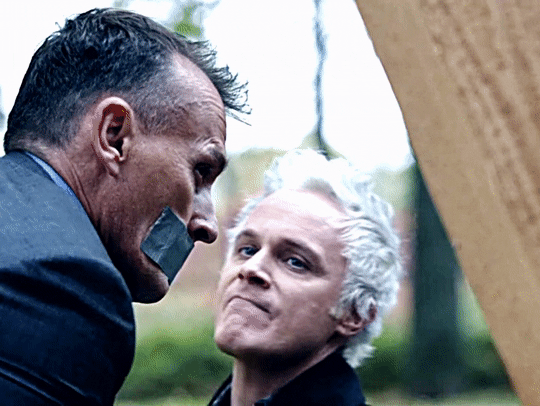


Without getting into the detailed immorality of what Blaine did surrounding his fake amnesia and Peyton, I think it is important to point out that this is happening on the tail-ends of Blaine's (failed) attempt to define himself outside of his father's ideology: He was willing to neglect his strive for power and his own values - in favour of being with another person. Which, apart from having been an absolutely horrendous thing to do another person, was kind of a big deal for Blaine (and I could already make some connections to the symbolism point I'm trying to make here. But I'm not sure if y'all out there are ready (unhinged) enough for that, at this point. We'll get there!)
We learnt that Blaine used this well for most of his childhood as a way to deal with his feelings, by using it as a wishing well to manifest his father's death - but also to count, very specifically, how often it happened. Blaine, it turns out, actually kept count of this, saying that it's 'about $1.40 in pennies down there'. Now, I was actually curious about this and it turns out that for victims in abuse situations, documenting and quantifying instances of abuse situations can be a way of keeping their sanity and trying to simulate some agency and control over the situation. (I also researched whether there is any meaning to the number 140 but I couldn't find one)
To make this very clear and explicit: What Blaine does is a very understandable, very human behaviour in response to the abuse he experienced. There is the big question what role we give Blaine's upbringing when we evaluate his actions as an adult. And personally, I think it plays a very big role. What I don't entertain is the notion that Blaine was simply always evil or so evil as a child that he deserved the abuse he experienced - that is something that the narrative very clearly identifies as the narrative of one of his abusers (Frau Bader), who thinks he was a monster, even as a child (very opposed to Angus' excuse, that Blaine was too soft and he was toughening him up). Blaine wishing for his father's death is not inherently evil, especially not for a child in an acute, multi-layered abuse situation. Using a wishing well to manifest the death of the man who abuses him, abuses his wife, is at least compliant with Frau Bader's abuse of him - and eventually even takes his grandfather from him, the only person still left - that is not 'evil' or immoral child behaviour. It's pretty balanced, all things considered. So what I'm going to say next has little to do with a moral evaluation or condemnation of actions - but a lot with the symbolism and being damnationed by the narrative.
Wishing Well
Earlier, I spoke of the origin of wishing wells as sacrifices to the well-gods, in exchange to which the spirits grant your wishes.
It's also in this context that I want to propose my first actually bold claim: The well does fulfil Blaine's wishes.
In fact, it probably grants the wishes of everyone who granted a sacrifice over the years. This is something I already once touched upon in the post I linked earlier and I'll link it again here where I listed every request Blaine has ever made of the well - and how they all came true. Every time Blaine is nearby that well and says that he wants something - it happens.
But: It also happens with a caveat. Some big drawbacks or logical loopholes. This is one of the most basic features in almost every kind of story, where you call on other-worldly forces: They give you what you want....except slightly to the left. It's the Monkey's Paw. Rumpelstilzchen. You find it with Djinni. The Sorcerer's Apprentice. Peter Schlemihl. King Midas. And very famously - the devil. While most of these stories are about warning you not to be cheap or not to get above yourself without doing the work or not to be haughty (e.g. The Sorcerer's Apprentice) - the deal with the devil is the Christian spin on it, warning you that sinful behaviour or a "literal" pact with the devil might give you what you want in this world, the devil is after your soul and wants to condemn you for the afterlife.
But that's another very important aspect: In most cases, you pay some sort of price. You make a 'deal'. There are exceptions to this - e.g. a magical artefact might grant you your wishes for free, even if get screwed over (Monkey's Paw) OR you already did the work to control the powers you're using (hence, you don't get 'punished' for "cheating" the natural order) and therefore get what you want - like in the case of the Golem, who only causes troubles if you did NOT do the work and make a mistake operating the Golem (like giving a faulty command or failing to remove the paper that animates the Golem. The Sorcerer's Apprentice was actually a gentile interpretation of a Golem story - and the mistake of the apprentice is that he didn't do ALL the work and overestimated himself and caused disaster/comeuppance.)
Based on the assumption that all the wishes uttered around the well on iZombie come true, let's examine the price of these wishes. I already went into this in the post I linked, but in short: These wishes are always accompanied by someone throwing something into the well. This is very literal while Angus is in there, because Blaine keeps throwing brains in there (not to mention threw his own father in there) and talking to his father (who in turn belives he's hearing the voice of God).
One example is in the first episode of season 4: Blaine talks to the well, complaining a) about how Chase has an army - and he doesn't. and b) that he wants to expand his business. He also complains about how much he hates working for Chase Graves.
Later in the same episode, Dino frees Angus from the well and this facilitates several things:
Another of Blaine's well-wishes comes true: In the previous season, Blaine talked at the well (while throwing brains in there) about how he wishes he had a father who loved him, the same way Baracus loves his own child and was willing to take a bullet for him. When Angus is freed from the well, he got re-wired into believing that he loves Blaine, that he has to make up for abusing him in the past and he wants to re-connect
Blaine gets his army: The cult of Brother Love who helps him stop the prison bus AND becomes his tool to carrying the zombie virus out of Seattle to help his real estate plan

He no longer has to work for Chase Graves after finding Renegade for him and on top of that, Chase Graves dies in the season finale (under the same guillotine that he showed Blaine in that first episode of the same season, in the Blaine-scene previous to the opening scene at the well. In many ways, his monologue at the well sets up Blaine's season arc for us.
He also gets his wish of expansion by the end of that season: Major makes him the number 1 brain supplier for New Seattle. He ends up rich.
So that's great, right? It's a wishing well! Post wrapped!
...
Except. If we entertain the notion that by some power of symbolism (and for the record, I'm w e l l aware that we're way past any writer intentions), the well actually does grant wishes, this raises one and a half big questions
how is Blaine being monkey-pawed?
and what about his original wish? What about Angus 'dropping dead'?
Well, let's first have a look at how all these wishes work out for Blaine:
his "army" meets the fate that many armies inevitably meet: Another army. They're destroyed spectacularly and his plan doesn't work out. Also his dad dies.
Blaine's own ill-gotten wealth and power go to his head and put him into a particularly vulnerable position: He loses everything and becomes the most hated person in all of New Seattle. After he was so proud of being a 'hero'
And ...did I mention that his dad dies? That was his biggest wish, right? Except...that first, original wish - that one took years of throwing in coins (and even even throwing in Angus himself) to fulfil - and that also came with a big fat caveat: By the time Angus finally 'drops dead', Angus was already Brother Love and made efforts to make (extremely toxic) amends in his relationship with Blaine. And not only that, despite having reservations at first, towards the end of the season and especially in the finale, Blaine actually built a sort of trust and opened up to having a relationship with this new version of his father for the first time (because that is the price of actually having the kind of relationship that Blaine wants with his dad: opening up. being vulnerable) - e.g. allowing him to talk about his mother and listening to him when Angus tells him he's proud. This is something I also wrote a long text about, but in short: By the time Angus dies, Blaine is, for the first time in his entire life, in a place where this would genuinely and first and foremost - hurt him.
So in short, that's how the well seems to work:
You feed it + you express a desire = you get what you want + eventually you get the opposite and get screwed over Monkey Paw style.
You will also find small examples of this. Like Blaine expressing that he would like to show his father his new car - and the first time Angus sees that car is in the scene in the finale, when Angus finds out that Blaine doesn't want to join the cult's suicidal escape from New Seattle and shatters the tentative relationship they had been building.
And I could count my eggs or whatever here, tell you that the well is a wishing well. Rest my case and go home. But...I promised you a little bit more. And we're in so deep now, there is no turning back. So.:
The Well is Hell (Hell is the Well)
Hades / Tartarus
Throughout his pre-Brother Love cycle on the show, Angus is often shown to have an avid interest in ancient history, especially ancient Greek history and mythology. This is already teased in his first appearance on the show:

Alexander the Great, himself the son of a Macedonian father and a Greek mother, traced his lineage back to the gods, even claiming Zeus his father. He also deeply valued Greek history and mythology,
The theme continues just a few lines later-
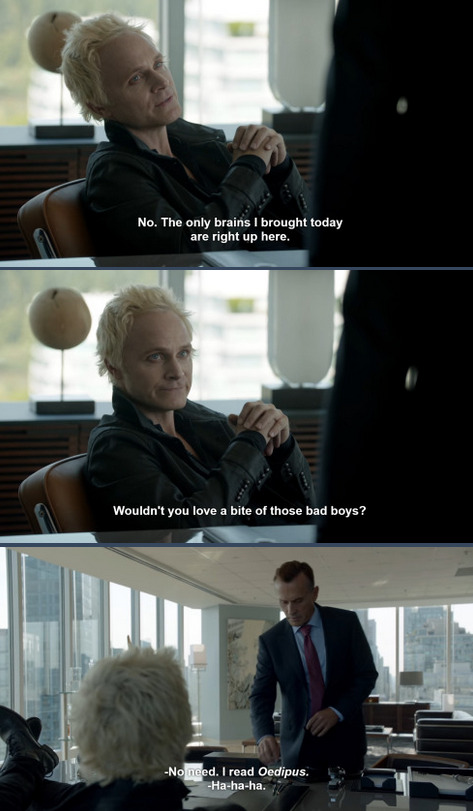
etc etc etc
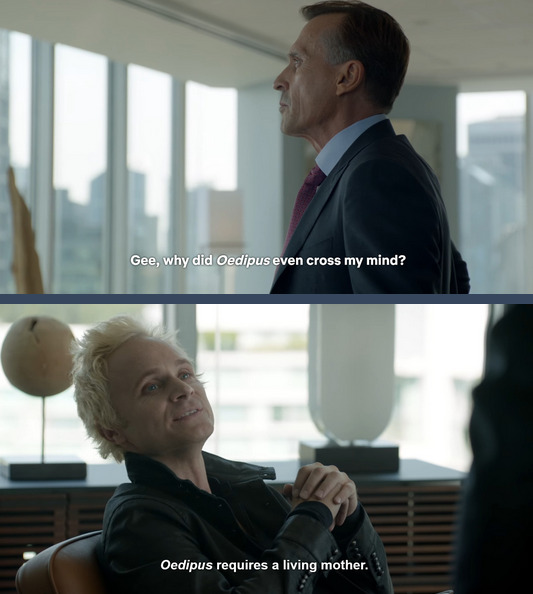
Angus' interest in ancient greek culture makes several appearances, usually in the context of Angus a) being disappointed that Blaine either pretends to or really doesn't understand his references and b) Angus seemingly not noticing that he himself really likes to reference tales where a father is killed by his son - and like in the Oedipus discussion, he usually positions himself as that father and Blaine as that son.


Cronus, like Angus, rose to power by overthrowing his own father (and also castrating him). So it's really in tune with Angus' self-glorification that he would compare himself to Cronus. Except, he presents this tale as if Cronus lived happily ever after as the king of the universe eating his kids.
But as is the entire point of this essay, you can only trick the powers of fate for so long: Cronus' wife Rhea (notice how Rhea stayed unnamed in Angus' account of the story much like the name of his own wife/Blaine's mother is never mentioned throughout the show?) eventually had enough of her husband's baby-eating habits. She took her youngest son and hid him - giving Cronus a bundle full of rocks to eat instead. And that young boy's name? was Albert Einstein. Zeus. Zeus eventually grew up and became the prophecied child to overthrow Cronus and tossed him - along with the other Titans - into the dark abyss of Tartarus, in the cave of Nyx:
We have some mythical description of what Tartarus was understood as:
"as far beneath the earth as heaven is above earth; for so far is it from earth to Tartarus. For a brazen anvil falling down from heaven nine nights and days would reach the earth upon the tenth: and again, a brazen anvil falling from earth nine nights and days [725] would reach Tartarus upon the tenth" (Hes. Th. 724-725)
"murky Tartarus, far, far away, where is the deepest gulf beneath the earth, the gates whereof are of iron and the threshold of bronze, as far beneath Hades as heaven is above earth! (Hom. Il. 8.14-15)
In Tartarus, according to one telling, Cronus lies in chains in the cave of Nyx (goddess of the night) where he is "chained within, asleep and drunk on honey – dreams and prophesies."
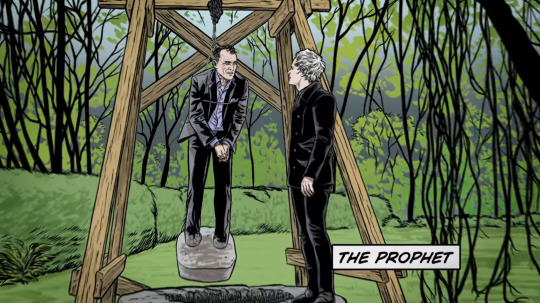
I think you know where I'm going with this.
And if you know where I'm going with this, you might have a very valid objection:
Originally, I claimed that the well would be Hades. Not Tartarus. These are two different spaces. And you're right! In this analogy, the well is Tartarus, the prison of the wicked dead, not Hades, which is the realm for all the dead. But considering that this metaphor is happening so far, far, far in the periphery of the funny zombie crime show, I am willing to let it slide as slight metaphor-mixing in the service of overall story-telling functionality.
Not to mention, Hades also makes its appearance, indirectly:
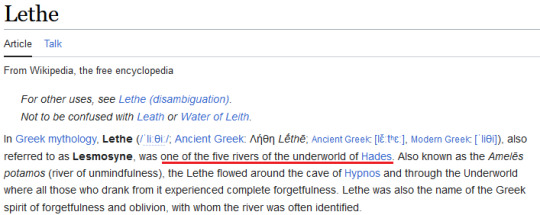
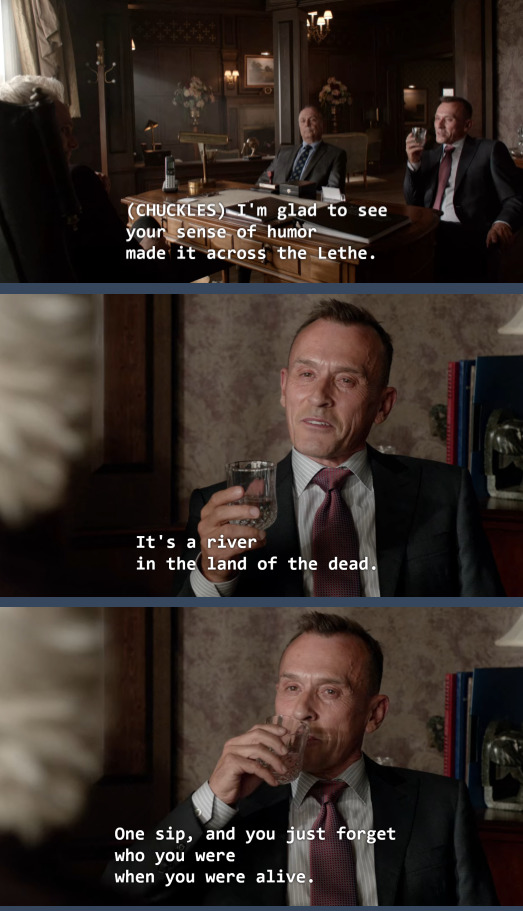
A few episodes after speaking these words while dramatically sipping from a glass of water, this man was found tossed in a mysterious well where he forgot who he was when he was alive.
There generally is a pattern of Angus, before his time in the well, predicting the future - without ever realising it. Not just in terms of Greek mythology but -
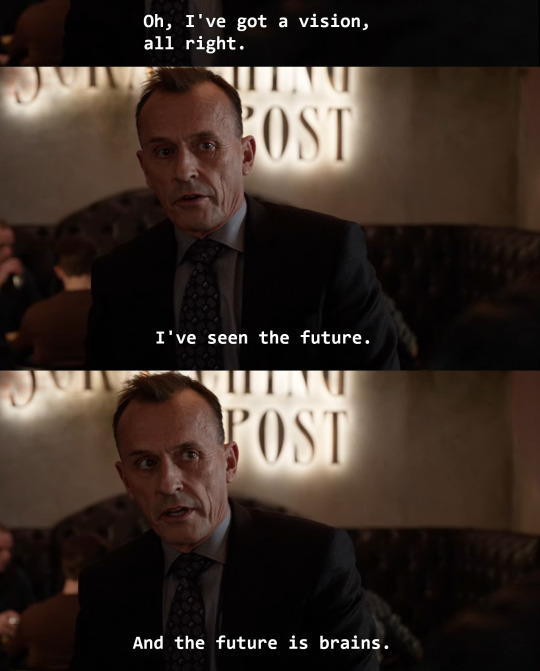
This is literally the same episode where he gets tossed into the well - aka the future where the only thing will happen is occasional brains being thrown down to feed him. Yeah, your future is brains alright. Just not in the big business sense that you expected.
So much like we have a mysterious pattern of the well granting wishes, we have a pattern of Angus prophecising the future - without ever realising it.
And this is also reflected in the specific choice of Greek myths that he decides to reference - and his clear lack of understanding of what he himself is literally implying (despite his own canonically vast knowledge of ancient myths and tales.) On the surface, the Cronos myth and the Oedipus myth have very little to do with each other. The reign of the fall of Cronos is a primordial creation myth of gods and titans. Oedipus' tale is (mostly) that of mortals.
The only things they have in common is a) the theme of people trying and failing to cheat prophecies (and thereby: fate, the order of the universe) and b) an abandoned and alienated son overthrowing and replacing his father.
Both with the Oedipus comparison and the Cronos comparison, Angus is trying to put himself into a position of power over Blaine (both with comparison he's making - comparing himself to the powerful Titan Cronos, comparing Blaine to unhappy Oedipus - and by making them in the first place, because he's trying to flex on Blaine with his own education/his disappointment in Blaine's lack of this education.
In fact, Angus' blindness to the actual prophetic nature of the things he says is already lamp-shaded in his first appearance. It is not just that he made another unintended prophecy (comparing Blaine to Oedipus, who unintentionally causes the death of his estranged father) - he also fatally misrepresents the myth: He compares Blaine to Oedipus, insinuating that Blaine's mourning of the death of his mother is excessive and that Blaine is resenting and punishing him because he holds Angus responsible for her death. But...that's not how the tale of Oedipus goes. By the time Oedipus meets and marries his biological mother, he had already (accidentally) killed his biological father. It is only when the truth comes to light that Oedipus' mother commits suicide and Oedipus blinds himself.
It is only after he 'drinks the waters of Lethe' - aka suffers ego death in the well - that Angus truly becomes a prophet and is aware of his making prophecies.
And I think it becomes even more damning when you realise that the fate of the Lethe strikes the entire paternal line of the McDonoughs (and no, I don't mean Blaine’s fake amnesia era. Though there was some real amnesia, for a while, let's not forget)
Grandpa McDonough suffered dementia after Angus overthrew him and eventually lost every connection to the world around him other than music. He finally dies at the hands of Blaine, who was planning to overthrow Angus by feeding him dementia brains.
Angus literally drank the waters of Lethe when Blaine threw him into the well. He died and became Brother Love.
Blaine tastes the waters of Lethe after the show ends - by turning Romero in the well.
Family legacy, honour, masculinity etc. are all values that are very important in Greek myth - and they are things that Angus is often shown to care about a lot (especially illustrated by the fact that he keeps attacking and humiliating others for not living up to those values). On the other hand, in Greek mythology, family dynasties tend to end in horrible tragedies - for many reasons and very often because of prophecy or hubris/arrogance. By the time we encounter the McDonough family, the inciting dishonourable act of hubris and disrespect has already been committed - Angus taking over his father's business by underhanded means and having him hospitalised. He had his father declared mentally unfit - and one after another, everyone in his family actually loses his mind and (more or less) eventually dies.)
Arguably, losing your mind and your identity is more relevant an ending to a person's life in this family than actual, physical death is. Only losing yourself mentally first facilitates physical death. Meanwhile, dying doesn't necessarily mean a final end - especially Blaine bounces back from the dead with impressive frequency. This is even true for Blaine's mother, who first withdrew herself and faded and removed herself from the rest of the family until she finally ended her life - losing all agency and independent identity in the process, to be only defined by and in Blaine's and Angus' narratives. (In fact, even though Blaine's grandfather's name is lost too, we get some pictures of him: We see him, we know what kind of art and music he liked, we see old photos of him on the wall of his hospice room.)
Blaine's mother isn't really given that same dignity. She is spoken of, but never really as an individual. She's mostly an idea. A ghost hanging around in the background of some of their conversation. She doesn't pass the lamp-test. (the test where you replace a female character with a fancy, expensive lamp - and then see how much this would impact the plot.)
The most important things to take away from this section:
Something that I think is very important here is that Greek mythology and especially Angus' fascination with it also serves as a visualisation of the rift between Angus and Blaine. Angus is frequently annoyed when Blaine doesn't understand his references to a subject that clearly means a lot to him. He clearly feels entitled to an heir with the same interests as him - a continuation of his legacy. We know he wants to be immortal and one way to live on is through your family and in a very patriarchal family, the way for a father to live on is through your son.
But...Angus also never put in the work. He never gave Blaine any good reason to emulate him or to take an interest in his father's interests. He never gave Blaine any incentive to spend time with him and do anything together. He never even gave him any reason to love him. He just expects Blaine to function as his heir because he is his son. But he...never really tries to be a father beyond the biology of fatherhood (he literally calls Blaine a 'waste of his sperm' before he gets tossed into the well). The person Blaine actually emulates - is his grandfather. The person who, according to Blaine, actually loved him. Blaine specifically says he has his love for music from his grandfather and even (claims he) takes after him in looks.
If we do take that leap of faith and consider that most of Angus' Greek mythology analogies have a prophetic character on some level that he isn't aware of (and that the show also frequently identifies him as a prophet in season 4) - then in these prophecies, the well is positioned in the symbolic role of Hades or Tartarus or rather, a wellspring to Lethe, one of the 5 rivers of Hades.
Another (third?) thing is the disappearance of Greek mythology from the show. After Angus' time in the well, the references to Greek mythology stop - and Brother Love isn't exactly invoking the Greek pantheon. Instead, the Cult of Brother Love leans much more closely on Christianity - and it is even confirmed what a great change that is: In S04E10, he tells his congregation that Frau Bader was 'always concerned about his immortal soul' - and that it should be very surprising for her to see him now as a priest. There are some references to it, like the statuettes we see at the McDonough Estate but those are old, from pre-well times.
So this brings me to the next part of my little essay here:


(pls don't make me spell out the halo-thing)
Christianity The Cult of Brother Love
Some brief disclaimer: I do not intend to talk about religion here. I AM going to look at Christian symbolism and the use of symbolic language on the show in order to decipher subtextual connotations in the same way as I did with Greek mythology earlier. My personal belief (or rather: lack thereof) does not enter in here.
First of, it's important to make a certain distinction: While the Cult of Brother Love is definitely inspired by Christianity and Christian imagery, it is not fulfilling many of the core tenets of Christianity. (e.g., I don't think there is literally any mention of Jesus other than Blaine asking once who the 'zombie-messiah' is going to be and Brother Love implying it would be him). I think there is a meta-reason for this (obviously, making it too Christian would piss a lot of people off). Also, since this entire cult grew out of Angus' delusions in the well and since Angus was canonically never particularly interested in Christianity, it makes sense that this would result in a very warped version of the original.
However, the change from the original ancient greek philosophies that Angus emulated vs the bastardised version of Christianity he practices in his cult does incorporate some of the core tenets of Christianity like the idea of universal morality which hellenic paganism didn't have (the cult actually looks down on 'heretics' and non-believers and thinks that every zombie needs to join the church and be baptised and that people who refuse are the enemy), repentance (Christianity has a much greater focus on the option of repenting for your former sins and being forgiven, while in ancient greek stories, usually actions -cause- the consequences - and while you can ask the gods for forgiveness, they are fickle and fallible rather than all-loving and all-forgiving, so whether they forgive or not can be mere coincidence), in fact: one, all-knowing, all-powerful god (Angus believes that the voice he heard in the well was the voice of god - and he is tricked again when Blaine has Don E throw brains into a wood-chipper to convince him that it is raining brains. He does this because he now expects a god who loves him and wouldn't mislead him and who knows everything and wants zombies to be safe.)
The well becomes an important aspect of the way Christian elements are used and turned on their head (!): Wells and waters play an important role in the symbolic language of Christianity, e.g. the idea of being cleansed by baptism and the powers of holy water cleaning and warding off evil and being used to bless sacred items and places in Catholicism.
There is a very important passage in one of the communal affirmations of the cult:
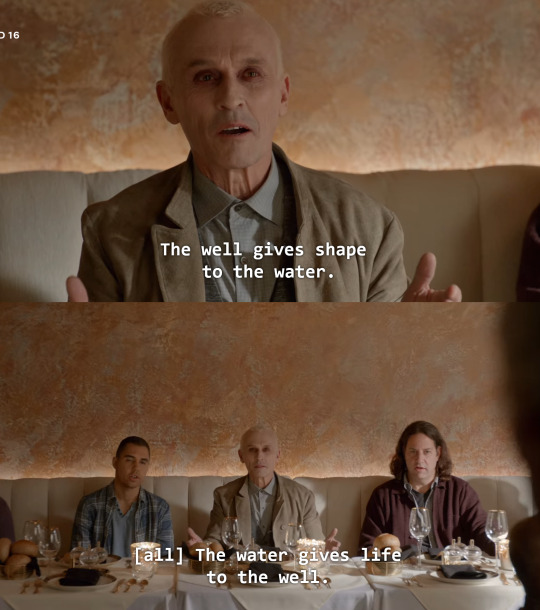
I believe this to be a vague meta-reference to a story from the New Testament, John 4:10-15, where Jesus meets a Samaritan woman at a well. He asks her for water because he is thirsty. During their conversation, Jesus shifts the conversation from the literal, physical water of the well to spiritual water e.g. he compares having faith to 'drinking living water' -
Jesus answered her, “If you knew the gift of God and who it is that asks you for a drink, you would have asked him and he would have given you living water.”
“Sir,” the woman said, “you have nothing to draw with and the well is deep. Where can you get this living water? Are you greater than our father Jacob, who gave us the well and drank from it himself, as did also his sons and his livestock?”
Jesus answered, “Everyone who drinks this water will be thirsty again, but whoever drinks the water I give them will never thirst. Indeed, the water I give them will become in them a spring of water welling up to eternal life.”
The woman said to him, “Sir, give me this water so that I won’t get thirsty and have to keep coming here to draw water.”
The reason I believe this to be a reference is that Brother Love also frequently makes the promise of 'feeding' - his cult, promising that by following him they will never be hungry again.
But it also gives us some idea about the relationship between the faith of the cult and the well:
The 'living water'/'water of life' in the analogy from the bible represents a relationship with god. But taking personal belief out of the equation, the Christian 'relationship with god' is simply - faith. It's believing in god. Just like the cult believes in their idea of god. Their idea of god is ...that god considers zombies the chosen people, that he wants them to destroy humans and eat them, that he loves zombies a lot. But this faith/water was given shape by the well: This 'God' was just Blaine talking to his father in the well and Angus who was slowly losing it trying to decipher meaning from his words.
This is also symbolised by Angus often echoing Blaine's words in a slightly warped way.
One obvious example:
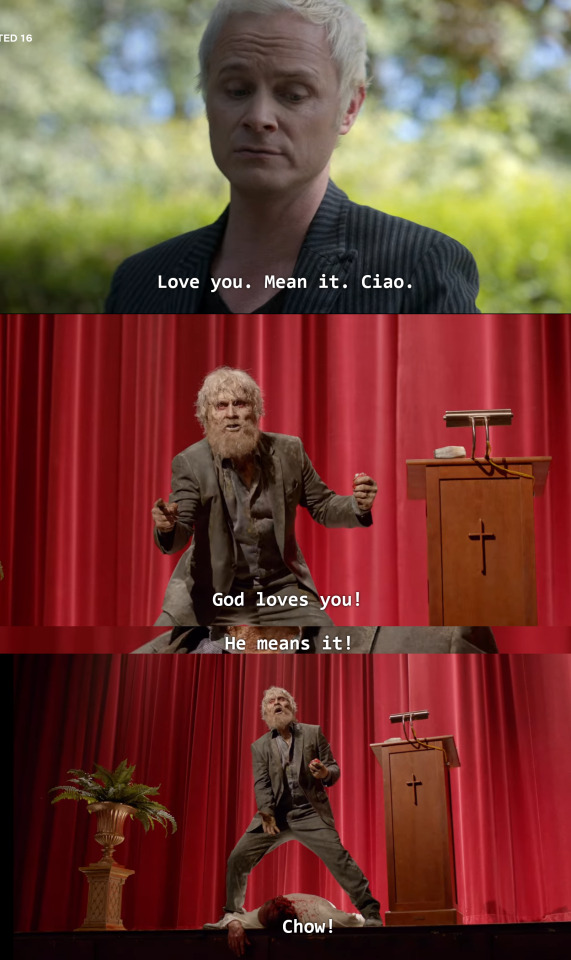
Basically, the well gave shape to their faith/the water by running interference between what Blaine said (wished) and what Angus heard and what Angus (driven insane by the well) is now parroting to his followers. And if we're still working under the assumption that the well is fulfilling the wishes of the people feeding it (coins, brains, people), then this interference, this 'giving shape' directly results in the well granting Blaine's wishes:

In fact, something that I find very important here is: Blaine never said the words 'I wish I had an army' - much less 'I need an army' or 'give me an army' like Angus cites it. While inside the well, Angus remembers hearing something entirely different from what we were shown was spoken into the well.
The reason why I think this is very important is tied back into the function of the well as a wish-fulfilling device: As I mentioned earlier, devices that fulfil wishes usually come with some sort of caveat. Sometimes, the wording is used against the person speaking the wish in an overly literal way (this is especially important in stories where a person has but a limited number of wishes because now they have wasted one). This, however, doesn't seem to be the case with our well here, because Blaine doesn't even need to express a wish - instead, through the interference of the well, his subconscious desires or the implications of his words are manifested into commands. That's how connected the well and he is at this point (I'll elaborate on this point later)
The well doesn't only give him what he says he wants - it gives him what he really wants. (In fiction there are usual different aspects of character intent. Usually, these are simplified into want vs need but personally I like to separate them even further:
What a character says they want (what they tell others)
What a character wants (what they think they want)
What a character really wants (the subconscious desire that is behind that conscious wish)
What a character needs (usually opposite of their actual wish/the thing they come to realise is missing from their lives and that they give up their wish for in the end)
For example, what Blaine says he 'wishes' when he's near the well is that his father would see his new car or he talks about what a brilliant businessman he is and how everyone in the city looks up to him - what he really wants is the satisfaction of proving his father wrong about what a failure he is as well as Angus' approval* because-

But what he actually needs is...to stop letting his father and his fucked up childhood have such an influence on the life he's living. What he needs is some actual human connection and self-actualisation.
*This is another very interesting aspect of their interactions: Angus again and again reiterates how successful Blaine is specifically as a businessman and how proud he is of Blaine for this. He says it at Romero's, he says it during his services, he says it to Liv even (showing that he genuinely believes this and doesn't just say it to prop up Blaine or get brains from him. He suddenly genuinely believes this) --- and the reason that this is interesting is that as Brother Love, Angus doesn't really care about money or riches anymore. He stopped caring about his own wealth, he gives donations to the poor. One of the first things he says, when he gets out of the well, is to call Dino a 'filthy lucre' (the word combination filthy + lucre is mostly originally used in the bible) when he tells his girlfriend that he wants a reward for freeing Angus. We know Angus didn't use to consider Blaine a real 'businessman before the well, we know he doesn't care about money after the well - and yet, he still feels somehow compelled to praise Blaine for exactly these things. The only thing that changed in this regard is that Blaine poured a lot of energy into that well, talking about how he's such a great businessman (and mentioning that it hurt him that his father doesn't think so.) This is another subconscious desire of Blaine's that the well fulfils - but it really isn't what Blaine needs or is good for him. What would be good for him would be to remove himself as far from this entire situation as possible. But instead he comes back and keeps coming back. The first thing he does when he finds out that he's a zombie is seek out his abusive father and infect him - out of all rich people he can and did infect later on. He was always waiting for that moment of revenge. And the thing is, Blaine probably felt like he was free after he grew up and cut ties with his father (or got cut off) - but really, he never has been free, or he wouldn't have come back after all this time.
Even more important in that regard and something that I rarely see anyone talk about: He never killed his father, as I mentioned, - and he never killed Frau Bader. Instead, he's upset by both of their deaths - despite all the people he literally murdered in cold blood, he was clearly not ready to see the two people die that he hated the most in the world.
The reason I think that this is interesting is that - the 'army' thing just showed us that the well doesn't need Blaine to (be able to) express what he wants for the well to make it happen. As long as he's throwing things inside the well (brains) and alluding enough, the well sets it into motion. And I feel like it's here that we encounter a problem: As a child, Blaine wished that his father would drop dead so that the abuse would stop. But he also wants a father who loves him. He wants to have a meaningful relationship with his father - throughout the show, he frequently seems at least as angry with Angus for abandoning him as he is with him for abusing him. Now, these are two very conflicting desires - but by turning Angus into 'Brother Love' and then eventually having him go on a suicide mission to be killed by the US army accomplished both - in the most painful fashion for Blaine, who finally was starting to develop some trust in this new relationship with his father, only to see it destroyed in the worst way possible.
There is something else I find very interesting in this regard. Now, if we follow the earlier assumption that the whole symbolism of Greek mythology functions as an illustration of the rift between Angus and Blaine and of Angus' feelings of patriarchal entitlement and ownership over Blaine as his heir as well as his feelings of anger and disappointment at Blaine's failure to live up to his expectations - then the disappearance of Greek mythology from Angus' repertoire when he becomes Brother Love also becomes significant. It shows a (seeming) change in his attitude. Which holds up bc in season 4, Angus (seemingly) has a very big change of mind, both about his own philosophies as well as his son.
So far, I've focused a lot on Angus' role in all of this - which makes sense. Because the Greek mythology stuff is mostly happening in Angus' side of the court. Blaine has very little interest in any of it.
In fact, there is a very obvious and very important fact that I frequently see neglected when people speculate about Blaine and his family: Blaine grew up with 1. a mother who checked out mentally, 2. a father whose entire care accumulated to 6 shared meals and 140 pennies worth of severe abuse incidences and 3. a grandfather who eventually also disappeared. As much as Blaine defines himself by his father's values - most of the time, he was raised by someone else. The person he probably spent most of his time with (at least further into his mother's decline) was Frau Bader.
This is a woman who had so much influence in the household, Angus was willing to let her inherit his fortune if Blaine killed him. Someone who could make a dog disappear without anyone asking any questions. Someone who could berate her own boss about his religion.
And that's one thing we learn about Frau Bader is that she is very religious. Specifically, she is very Christian. Blaine, throughout the show, is shown to have a lot of contempt and disinterest for religion and - especially (x) Christianity, something that especially becomes evident in his interactions with Gabriel and his first encounter with one of the cultists.
But there is one noteworthy relevant difference between Blaine's contempt for Christianity compared to his contempt for his father's obsession with Greek mythology: He also seems to know at least some things about it. In fact, he shows a quite detailed knowledge of it, beyond what is the natural osmosis in a culturally Christian society.
While he doesn't get understand his father's obscure references to Greek mythology, he understands - can even make - obscure references to the bible - e.g. comparing his own attempt to tempt Gabriel into giving him the tainted Utopium recipe to Jesus tempted by the Devil during his 40 Days in The Wilderness. This is not...something everyone knows. Considering that he seemingly didn't have a father who valued religious education (prior to being brainwashed by a well) and Blaine doesn't seem to have an inherent active interest in theology (rather, he dislikes it and I don't see him seeking out Sunday school or reading the bible at any point during his adult life - the most likely implication is that this was passed down by Frau Bader. The fact that Frau Bader also tried to proselytise to Angus might even be the (literal, non-symbolic, non-Lethe,) reason why Brother Love's particular insanity takes this shape. And if she proselytises to her boss, what are the odds that she wouldn't proselytise to the child in her care?
Blaine's seeming disinterest and contempt for Christianity also reflects his complicated relationship with his abusive nanny: On the surface, he doesn't care about Frau Bader one way or another. He never actually bothered killing her. He didn't even infect her in order to obtain power over her or humiliate her somehow (likely because she's not rich enough for him to exploit her in any meaningful fashion that would be worth the added emotional baggage of having to deal with her again). Much in the same way, his seeming disinterest and his dismissive attitude towards Christianity is belied by the fact that we learn that Frau Bader was a very religious person - and that her religious beliefs played a significant role in her abuse of Blaine: She believed that Blaine's transgressive and rule-breaking behaviours as a child made him a 'monster' that needed to be disciplined.
The word 'monster' is very important here imo because it is a word that speaks to a belief in inherent evil. Now, Christians believe that (all) humans are inherently sinners (not monsters). Human nature makes them imperfect and fallible - but they also believe that everyone can be saved through repentance and a relationship with God/Jesus. And here I think it is also very interesting that lack of belief doesn't seem to be what sets Frau Bader off: Clearly, she thought that Angus could be saved if he only started believing and going to church since we know that she was always 'worried for his immortal soul'. Now, we cannot know whether to her religious-nutjob-brain there was something about child-Blaine that set her off in particular or whether she's just an abusive person and inflicted his on the first best helpless person she had power over (or maybe even every child she had power over). What we do know is that for some reason, she thought that Blaine was abnormally evil or monstrous somehow. (we often hear some stories about how disruptive Blaine was as a child, but something that I think is important to point out is that most of these stories are implied to have taken place when he was no younger than 9 or 10 years old while Frau Bader was implied to have joined the household much earlier and Angus' abuse probably going on at least as long, likely longer than that. So it is very likely that the disruptive behaviour is a result of the abuse, and not vice-versa).
The reason I'm bringing this up is the following:
We know that Blaine is pretty obsessed with power - he's literally talking about how he's going to run the entire city. And I feel like this scene comes very close to touching on the origins of this: Power means safety. In his childhood, while Bader was the person who spent the most time out of all adults having power and authority over him (and abusing that authority), Angus was objectively the most powerful person in his life. That's why he asked his father to protect him from Bader. (btw, I also consider the fact that he quotes himself calling Angus 'daddy' when he asked him to help him another indication towards how long Bader was working in their household and how early all of this started.).
As far as we know, he never threw pennies in the well over Frau Bader - just like he never went after her the way he went after his father. Just like he represses his religious trauma by neglecting the issue and making light of religion and avoiding it, he deals with the Bader-situation by ignoring her and minimalising the impact she had on him. This is very different towards his attitude regarding Angus. And this makes sense considering Blaine's whole worldview: Family is one of the few things that actually matter to him. Bader isn't family and while he detests her as a horrible person, Angus, as his father, owed him much more - and therefore betrayed him far worse. That's why he can yell and shout at his father for being a 'child-abusing son of a bitch' while he himself killed dozens of homeless teenagers.
Another thing that stands out: This very scene is referenced again in Frau Bader's death scene:
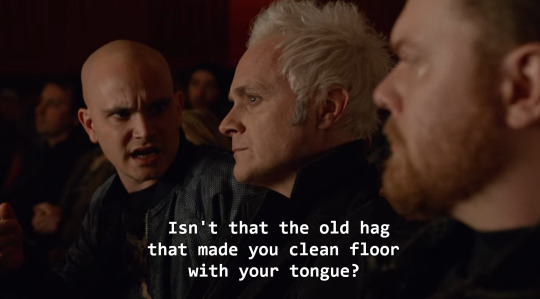
Now, this line clearly exists primarily because we haven't seen or heard from Frau Bader since season 2. But out of all the things that Don E could have said (or Blaine could have said) to identify her for the audience, they chose to reference this scene - to which Don E wasn't witness. We never learn how Don E obtained this particular information about Blaine's childhood, so it would have been far easier to refer to her in other ways. For example, Don E walks in on them listening to Angus' video will.
The reason I bring this up is because they reference the scene where we learn that Blaine asked for Angus to help protect him from Frau Bader - in the very same scene in which Angus, now as Brother Love, kills Frau Bader. And even also acknowledges that he knew of the abuse and did nothing and that he specifically failed Blaine in his duties as a father.
And here is the thing about this:
If we assume that Blaine's resentment of his father is not just rooted in the abuse and not just rooted in the trauma of negligence but ALSO specifically in his refusal to protect Blaine from Frau Bader (pretty canon, based on the torture scene in The Whopper) AND if we assume that (based on the army-thing) that the well facilitates Blaine's wishes even when they're not explicitly stated, then Blaine's wish for Angus to 'drop dead' also entailed that particular grievance. Until eventually, in the same breath as fulfilling Blaine's wish for a father "who cares that much" (another wish that was subconsciously implied in Blaine's resentment of the father he was given), the well gives him a father who does defend him. And that's how Brother Love specifically ends up killing Frau Bader.
(which raises another issue for me: On the textual level, I attributed Blaine's ... disinterest? refusal? avoidance? to kill Bader for what she did to him to his refusal to seriously connect with his trauma and accept what has been done to him. But on the metaphysical whatever-level we're moving on, it makes me wonder whether Blaine was even ever able to kill Bader - or whether that role had always been assigned to Angus all along)
Hell Is The Well
I mentioned earlier that the cult has a pattern of turning things on their head. And some of that is simply because it's a cult and therefore engages in things like behaviour-control, information control, thought control, emotion control etc. and warp any actual Christian teachings to fit the cult-agenda.
But a lot of that also comes from the fact that Brother Love is working under a false assumption - one that as the audience we know to be false: Brother Love really believes that he received/receives signs and messages from god and is doing his bidding.
And it's not just that confused Blaine's voice with the voice of god - he completely conflates them:
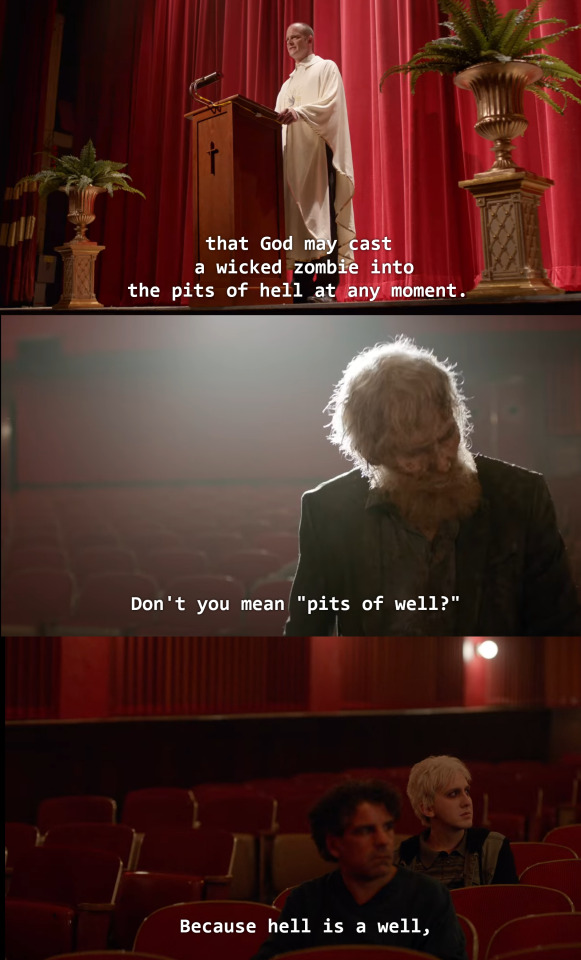
He believes that god threw him in the well and spoke to him there and even when he's back out, he points out that Blaine's voice reminds him of the 'voice of god' and names him the 'zombie messiah'. (we also see a complete conflation of family relationships /identities here with Brother Love going back and forth between referring to zombies as his siblings and his children, casting Blaine in the role of god (the father) but also as his son. Just like we have the conflation between Blaine as a mortal (or zombie) with him being 'god' while on the other hand, he's also a character commonly likened to or compared to the devil throughout the show (which would change the implications of the well/hell and Blaine's role in brainwashing Angus and Angus' misreading of the situation entirely.) Basically, through the interference of the well, Angus doesn't really seem to know who Blaine is anymore. It seems to kind of splinter his identity.
This warped perception is also an evident in the 'poisoned chalice' aspect of Angus' 'cleansing' in the well (showing us that this is not a real cleansing or something 'good') and 'purifying' and Blaine's role in it are also illustrated by the fact that Angus does not become a good person - or the heaven-sent prophet he considers himself:
As Brother Love, Angus simply exchanges his extreme individualism and personal superiority complex for a new kind of chauvinism - with very similar results:
Angus believes that he is better than everyone else. Brother Love believes that zombies are better than everyone else.
He takes himself out of the equation, even stating that he isn't sure that he will see all his prophecies come true - calling himself 'merely the Baptist John', while simultaneously being the driving central force behind the cult, literally controlling the members' minds and how they move and how they eat and that eventually, they go to certain death with him. At first glance, what he offers is charity, but he also demands complete obedience in return. And like any extremist, he also starts cannibalising the cause and the people he's allegedly defending - which means that any zombie that steps out of line or allies with the humans or doesn't support the cult is a heretic. Those zombies that bought the zombie cures? They're heretics deserving of death, in his eyes. Filmore Graves soldiers are all deserving of death in his eyes.
As Angus, he talked about 'unlimited growth, unlimited wealth' - something that is impossible to accomplish on a planet of unlimited resources (especially if your product is human brains and your customers need to eat them to survive). This kind of attitude of rich people is what is destroying the planet right now. And because he wasn't really changed or cleansed or "purified" in the well, he simply becomes the harbinger of the apocalypse in a much more literal fashion:
He eventually ends up riding out on horseback, about to bring the end of the world because Blaine told him he had a vision that they were supposed to turn 'half the population of the earth zombie, keep the other half for food', meaning that one half is going to wind up being eaten, the other half is going to starve as Romero's. (no, seriously, they HAD to include a horse for this. Which...makes him either War (it's a red horse) or Death (and he who sat on it had the name Death; and Hades was following with him. Authority was given to them over a fourth of the Earth, to kill with sword and with famine and with pestilence and by the wild beasts of the Earth.)
Now, I don't want to dissect all of this, because this is supposed to be the well-post, not the brother-love-cult post - but I think it is fair to summarise that all of the misconceptions and the entire horrible development of this cult and the symbolism around it make a lot more sense if you take them by their world - the well is hell. And hell is where their 'living water' (aka faith) came from.
Blaine & Loss of Personhood
I mentioned earlier that we were going to talk about Blaine losing himself. Which is another big feature of well-stories - drowning, becoming the well, forgetting who you are...) There is one myth I didn't talk about so far that might come to mind. For one, it doesn't feature a well, specifically, but rather just a body of water. Also, the title is very loaded and might raise wrong expectations regarding where I want to go with this entire post. And lastly, I really only wanted to get there after I explained a lot of my reasoning already, especially the conflation of identities we encounter around the well and Blaine's person.

I know this is a step back towards Greek mythology but let's take a moment to talk about Narcissus.
To get this out of the way with, Narcissus is obviously most famously the guy who loved himself so much that he fell in love with his reflection in a pool of water. And...honestly, a conversation can be had about Blaine's degree of self-obsession and arrogance etc. but ...that's really don't where I want to go with this.
Because while Narcissus is obviously mostly associated with the character trait we named after him - and even the medical condition of "Narcissistic Personality Disorder" - an obsessive love of self is by far not the only theme or interpretation of the Narcissus myth. Important themes also include a loss of self, a yearning for something that isn't real, the rejection of others and the doomed attempt at complete independence.
To give you a brief summary of the full Narcissus myth: When Narcissus was born, his mother asked a prophet (here we are again) whether her son would live a long life and the prophet - Tiresias - prophecies that he would live a long life unless he gets to know himself. Narcissus eventually grows up to be quite the handsome guy and is courted by many men and women including the nymph Echo, another very tragic figure in Greek mythology. Narcissus rejects all of them - usually very haughtily - and especially Echo, who had her life ruined by a curse courtesy of Hera (yeah, one of those stories) and thought she had found love and companionship with Narcissus, is absolutely heartbroken. Nemesis, the goddess of retribution, steps up for the humiliation Echo has suffered and curses Narcissus to fall in love with his own reflection - which he does. Eventually, he just starves and withers away at that poolside, yearning for the elusive man in the water. (also, poor Echo has to watch all of that and eventually runs away into a cave to die there)
I mentioned some interpretations of this, other than the most famous one: For Narcissus to (rudely) reject all these proposals also meant a serious rejection and withdrawal from society at large. One interpretation of these rejections is a refusal of Narcissus to let anyone have power over him (Ledermann, R. (1988). Ovid’s Myth of Narcissus. British Journal of Psychotherapy) - There are different ways to translate Ovid here, but basically Narcissus says he'd rather die than give her what is his or let her have power over him (one translation being: ‘Away with these encircling hands! May I die before what’s mine is yours.') Narcissus rejects other people because being with someone means they have power over him and that thought terrifies him - he's scared of real intimacy. This makes even more sense when you know that Narcisuss is the product of his father's rape and abuse and imprisonment of his mother Liriope (another Blaine parallel).
Another big theme of the Narcissus myth is the longing for something unattainable to the point of delusion:
The feelings of familiarity that underpin recognition are often based on the perception of similarity. Ovid draws our attention to similarity when he shows us Narcissus struggling to come to terms with his love and its inaccessibility. All Narcissus can do is look and long, he cannot possess, and we see a mirroring of faces, arms, smiles, tears, and declarations of love:
…Whenever I move to kiss
The clear bright surface, his upturned face strains closer to mine.
We all but touch! The paltriest barrier thwarts our pleasure.
Come out to me here, whoever you are! Why keep eluding me,
Peerless boy? When I seek you, where do you steal away?
It can’t be my looks or my age which makes you want to avoid me;
Even the nymphs have longed to possess me! Your looks of affection
Offer a grain of hope. When my arms reach out to embrace you,
You reach out too. I smile at you, and you smile at me back.
I weep and your tears flow fast. You nod when I show my approval.
When I read those exquisite lips, I can watch them gently repeating
My words… Ov. Met. 3.451–62
TOMKINS, L. (2011). The Myth of Narcissus: Ovid and the Problem of Subjectivity in Psychology. Greece and Rome, 58(02), 224–239.
Narcissus longs for something he can never have. Whether it is his arrogance or a fear of intimacy and dependency, it does make Narcissus unable to experience the same kind of love and relationships other people can have. He clearly yearns for these things, but he can never have them (unless he were to make some real changes to his personality and priorities). As is, he can only look in from the outside - both on the kind of lives and intimacy that other people have as well as on his own reflection that he falls in love with. And even bigger than that: He falls in love with something that isn't real. While he does eventually come to realise his mistake and understands that it was his own reflection that he fell in love with, he originally thought that there was a real person, a real lover, real intimacy waiting for him, just separated from him by the surface of the water.
Another interpretation - one that I consider particularly important here - is the theme of loss of identity. On the one hand, Narcissus is obsessed with himself. He's in love with his reflection. But he also fundamentally neglects himself as a person. He loses himself. He is so preoccupied with the yearning for something that isn't real and dreaming of something that he cannot have that he literally starves to death and withers away. Even that what we most closely associate with Narcissus - his beauty - is gone in the end: "He no longer retains his colour, the white mingled with red, no longer has life and strength, and that form so pleasing to look at, nor has he that body which Echo loved."
And here's another very big hypothesis for his little essay:
Blaine also loses himself
(and it has a lot to do with his commitment to the well)
Blaine loses himself and his humanity. It's his arch that spans the entire show. It's a central part of his character development.
I noticed a lot of people saying that while they loved Blaine in previous seasons or 'loved to hate him' - they really lost all patience with him by season 5. That they could no longer muster up any sympathy and just found him detestable and insufferable at this point.
But the question still remains ... what changed so much about him that people feel that way? Because Blaine was literally always a horrible person, from the moment we meet him. Literally in the first two episodes we find out that he's manipulative, murderous, and he's willing to risk the zombie apocalypse for some quick profit - basically rendering all the sacrifices that Liv made to contain the disease ineffective. We learn that he uses sex to spread the virus intentionally, that he kills children and ruins lives left and right. In fact, season 1 Blaine seems particularly awful. But he was always a fan favourite.
People love Blaine, because aside from being an absolute monster, he was a fully-fledged person with many complexities and idiosyncrasies - especially from the beginning of season 2 onwards. We know about his backstory, his weaknesses, his personal flaws and feelings.
For example, we know that Blaine really likes the arts and music and sophisticated things. It's part of his characterisation as a hedonist, one of the traits that his father hates so much about him because it overrules his ambition. It only positions Blaine as an opposite to Liv, who was too busy to care much about art and music when she was alive - but when she died, she was forced to take a step back from her ambitions and this, in turn, taught her to enjoy life a little more and actually take in the world around her. She actually starts to liv(e) Liv Mo(o)re after she died. Her ambition didn't let her live her life - in fact, she wasn't even living her own life, she was following the dreams of her mother.
Meanwhile, this is one of the first deaths we see the original Blaine die: He only becomes ambitious after he becomes a zombie/dies. And while we know that he already did a lot of horrible and manipulative stuff in the past, he only gets worse after his 'death'./undeath?
But we also begin to learn other things about him like him being incredibly invested in music to the point of impracticality (leading to him being overly trusting with Lowell.) And this is especially interesting because it gives us a first insight into his youth:

I feel like the information we get from this is underrated because we learn quite a few things:
For one, we can at this point already make an educated guess that Blaine's childhood and/or youth was not a particularly happy one. He's not just saying that he liked Nirvana as a kid or even loved them - he's saying they were like a soundtrack to his youth. Nirvana gets deep into themes like mental illness, isolation, alienation, disillusionment, trauma, rebellion, homelessness, neglect etc. And while you don't need to have experienced these things to relate to Nirvana's music, we do happen to know (or learn later in the show) that many of these things are quite familiar to Blaine so it makes sense why he would specifically describe it as a soundtrack to his youth.
Additionally, we have Blaine stating that his childhood ended with Kurt Cobain's death. Obviously, even if everything is alright with a kid's life otherwise, the death of a star they looked up to (especially in such a horrible fashion) can be a traumatising event. But someone identifying it as the end of their childhood even 20 years later means ... this was really the last load-bearing pillar of something breaking away. It also tells us that something fundamentally changed in Blaine after that event. That he became a different person than he was before. Obviously, there are some positive interpretations to someone saying that their 'childhood ended' - if there is a focus on growing up and if this happens later rather than earlier, it is even an urgent thing, when someone finally grows. It means that someone has more freedom and more choices and is mature to start shaping and designing their own life. But it's pretty clear that this is meant in a negative sense. Growing up and becoming an adult also comes with a lot of sad truths - it means giving up a lot of illusions about he world, about goodness and fairness and hope and certainty. And whatever amount of these childhood notions Blaine had maintained up to this point died with Kurt Cobain. He took one step closer to the adult that we know he eventually would become: Someone who is very cold and callous and cynical and uncaring.
The rest of this statement also puts this into perspective: We learn here that Blaine - as a child - had friends. And not just that, apparently friends who considered him a source of comfort, someone they can share their pain with and not...expect the kind of dickishness that we associate with adult Blaine who would probably mock a person for being sad about something like this. In fact, we're talking about a person for whom the final culmination of their entire life story arc was him betraying his only friend and that friend telling him that 'no one could ever love you' and 'I was the only one who could even stand you'. That's adult Blaine. That's who he turned into. Meanwhile, as a child, there were people who loved him. Not just his friends but also his grandfather. I think that this is very important: As a child, Blaine is implied to have had a certain capacity to care for others and he was someone who was approachable and reliable and good enough to actually be friends with or to love. This is one first aspect of his identity that Blaine eventually sacrifices in order to be safe from pain like the death of his idol - and to be able to hurt people left and right if it means an advantage for him. (Which is basically adopting one of his father's values.) While there are people who care about Blaine and maybe even love him - there is usually only so much of real emotional intimacy that he's able or willing to give back. You have Jackie who forgave him for turning her into a zombie and even sided with him when his two henchmen wanted to usurp him and offered her cheaper brains - she was definitely loyal, but he still killed her. There was Peyton, who actually respected him because he was the only one in the city who was willing to stand up to Mr Boss - for all the wrong reasons obviously - but he still couldn't love her enough to be honest with her or to put her agency and wishes first (and I think it really shows the progress of Blaine losing even more of his humanity when he loses the basic decency of wanting to be with her on a consensual basis and of leaving her alone after she left him. (That is another stage of his undoing: Blaine's relationship with Peyton was barely consensual to begin with, it is happening under a pretence - but that pretence is for his benefit as well as hers. Back then, he still convinced himself he could have a relationship and a genuine connection to a human being. In the end, he doesn't even care about the pretence anymore)
I think another relevant example is Blaine's grandfather. His grandfather was one of the few ties Blaine actually had to the rest of humanity: When he was a child, his grandfather was one of the few people who actually loved him. We know the great impact his grandfather had on him because of how much he shaped the more human sides of Blaine (and that Blaine is aware of this). In the hospice scene, Blaine specifically calls attention to this: He points out his grandfather passed on his love for music to him. There are also small things like the Dutch paintings in the hospice room while Blaine is frequently associated with Dutch art (in his basement office, in his mansion later). Even Blaine's love for his grandfather itself is a result of that: Blaine's grandfather genuinely seemed to have cared about his grandson and loved him (something that Blaine even quite viciously snarls at his father at the beginning of season 2, when Angus just seems confused about his father 'babying' Blaine). In turn, Blaine - who seems to hold quite a bit of resentment for pretty much everyone and only maintains relationships that benefit him and always puts himself first, just like he learnt from his father - actually cares quite selflessly about his grandfather. He seems to pay for his hospice care and visit him regularly, There are books there implying that he reads to him, he plays music for him, even kisses him on the forehead.
By killing his grandfather, Blaine also killed an important part of who he is as a person - the part of him that is a person. A part of him that is genuinely good and has the capacity to love other people in a selfless and authentic way. And the big question is - why did he kill his grandfather? - to get back at his father, the worst part of him. Basically, the murder of Blaine's grandfather in favour of revenge against his father is the start of a development: Blaine made the ultimate choice against breaking the cycle, against ever freeing himself. This is his Hamlet stabbing Polonius - by infecting his father, he turned from a passive to an active player in his family tragedy, and now, the tragedy is beginning to escalate. This becomes even more evident considering the immediate futility of it as he finds out that he cannot feed his father his grandfather's brain because, in the meantime, Angus was abducted by the Chaos Killer.
(I have officially run out of characters, continuation here (x)
18 notes
·
View notes
Text
Preliminary Poll
Matthew Leibowicz/Two-Gun Kid

Submission reason:
"Matt Hawk (real name Leibowitz), when introduced, was a jewish defense lawyer from 1873 who firmly believed in the right of EVERYONE, even a guilty man, to a trial. While he also moonlights as the cowboy masked adventurer Two-Gun Kid to protect the town of Tombstone, he takes on defense cases even for criminals he knows are guilty because they still have that right to a defense, guilty or not. This is a foundational trait of his character seen over and over again in multiple stories (and he predates Daredevil by a year and a half)
But ever since Steve Englehart got ahold of him, people have been sanding that aspect of him away. Even the Very Gay scenes with Hawkeye don't make up for the fact that he's been reduced to ""teehee cowboy man stuck in the future!"" removing all of the strong moral compass that made him stand out from the other Kids (I've already submitted my essay on Colt but Matt is a close second) Dan Slott completely wiping away his ability to practice law and reducing him to a ""Man of Action"" when his action has ALWAYS Been fuelled by his moral compass while also trapping Matt in the future in such a way that he could NEVER GO HOME AND SEE HIS LOVED ONES AGAIN was bad enough ESPECIALLY when he proceeded to treat TG as a joke for most of the run when there was actually a lot of REALLY INTERESTING legal shit going on that Matt SHOULD HAVE HAD OPINIONS ON....
then Ed Brubaker decided to add insult to injury by saying ""OH tee hee no Two-Gun can go back to the past actually! But only when ALL HIS LOVED ONES ARE DEAD and he's not allowed to stay in the future where he built a life! No! All he can do is waste away in a nursing home as an old man with no one he loves left alive BUT IT IS OK BC HE GETS TO SEE THE AGE OF HEROES BEGIN!!!""
BULLSHIT BULLSHIT BULLSHIT
HE IS STILL ALIVE IN 616 HE IS LEADING THE DESERT STARS EXCEPT NO ONE CARES ABOUT HIM MARVEL FIX THIS HE DESERVES A BETTER ENDING!!!!"
Matt, for the vast majority of his appearances, is a principled defense lawyer because he is a firm believer that everyone is entitled to legal representation in court, guilty or not. He takes on guilty clients, he takes on clients for FREE. He has a second identity as the masked vigilante the Two-Gun Kid, but as the Two-Gun Kid, he does not kill- though he specifically keeps the two identities seperate to protect himself and his loved ones. There's a lot of time travel bullshit that happens with Matt, wherein he goes to the future, gets to be cowboys with Hawkeye for a while, then goes back to the past before being permanently trapped in the present time as a sentence for illegal time travel. (this is relevant later) He's not allowed to practice law anymore, and with it all of Matt's eloquence and thoughtfulness is stripped away. He's just a cowboy, and the part of Matt that made him so principled and so concerned about justice is gone- he's a comic relief character that gets shoved into a love triangle and never seems to miss the people back in his own time (Because he has AT LEAST FIVE BEST FRIENDS) or he's used as background cameos when Marvel needs superheros to get trapped in earthquake rubble. To add insult to injury, ED BRUBAKER decided to write a book about the Golden Age heroes, realized he needed someone to die of old age to inspire the new Golden Age. He decides that, instead of letting Matt settle peacefully into a life in the future with new friends and new family (and Hawkeye, probably) he's going to amend Matt's sentence so that when he's old and all of his friends are dead- and that is explicitly stated in the text- he HAS to go to the past and die alone and among strangers. But it's OK! Matt gets to see the Golden Age of Heroes!!!!! Anyway Marvel also can't decide if he's alive or dead in present 616 canon even tho tha'ts his canonical end, can someone PLEASE Get the Cowboy Lore Straight And Put His Characterization Back Where It Came From Or So Help Me-
#look how they massacred them poll#look how they massacred my boy#marvel comics#matthew leibowicz#matt leibowicz#two gun kid
16 notes
·
View notes
Text
I think in a vacuum idolomantises designs and art is decent and I wouldn't blame any of his fans for disagreeing with my criticism regarding it , considering he managed to get his bug comic off webtoon canvas and be "official" (idk exactly how that works or proper terms for it?) , he clearly worked hard for it. Regardless of my personal opinions, anyone who can find the motivation to commit to a long term project and put themselves out there deserves respect for that at the very least
It just my first exposure to him was from his redesigns and criticisms regarding Vivziepop , so I can’t help but compare the standards he sets onto other artists (mostly vivziepop) and than now that applies to his own art
I won’t deny there's some bias on my end when discussing his work. Not because I think Vivziepop is an artistic genius who can't do no wrong (my god has she done a lot wrong) , but it's incredibly fascinating to me how idol is capable of going in depth regarding giving criticism to Vivziepop's work
and then you look up his actual art and writing , and it's not only suffering from similar issues to Vivziepop's work, but it's got even more glaring issues I'm frankly surprised Idol didn't spot before posting?
I will say I think Monsters and girls is the better comic compared to Bugtopia , primarily because it’s not meant to be as plot focused and works more as a gag strip collection. I think with that one idol either needs to make the lore of monsters and girls actually relevant to the characters and have the art reflect said lore ,(just look up my post discussing Sera’s design for why) or just throw it all out the window and be more weird with it. Like the looney tunes logic of “who cares so long as it’s entertaining” but it’s lesbians instead of drag queens
With idol’s bug comic however, it flip flops to a story that you’d expect for a young child (like Dot trying to find a cake or a bunch of kids going to school) to discussing the sex life of random characters with no lead way or transition, it just randomly does that throughout
Obviously you can have children characters in stories for older audiences, even ones for just adults. The problem is the tone feels extremely different when idol swifts focus between the characters
It’s like if in the Rugrats the babies had their normal baby adventures, but then we switched focus to the adults and suddenly they’re discussing BDSM and their fetish preferences. It’d just be genuinely bizarre to do, even if said hypothetical Rugrats example was an adult only cartoon
and like I got a lot of problems with the world building but I’m just gonna leave it at this: How come tiny little insects that exist in a world with normal sized animals (and presumably humans) , somehow have human food and objects, such as New York styled cities, that’s insect size? Why isn’t the comic taking advantage of the fact these characters are bugs and using that to make creative environments to enhance the world building/lore (like homes inside of trees or cell phones as TVs?) ???
#rambles#idolomantis critcism#character design#Still amazed they called me a mad hoe for a vague post where#Literally the ONLY way you’d know I was talking about him was the fact I said “webtoon artist with a viv hate boner”#Like yeah I was talking about him but it wasn’t tagged#And there’s millions of artists on webtoon I seriously doubt that he is the only one on the app who doesn’t like viv#But yeah his criticism and art is really fascinating to me to compare#I honestly doubt anyone else has ever considered comparing the two much less make any connection#Because I think it’s a whole other experience compared to someone who reads his comics and not his viv criticisms#Obviously a series on Amazon is drastically different to a webcomic BTW
3 notes
·
View notes
Text


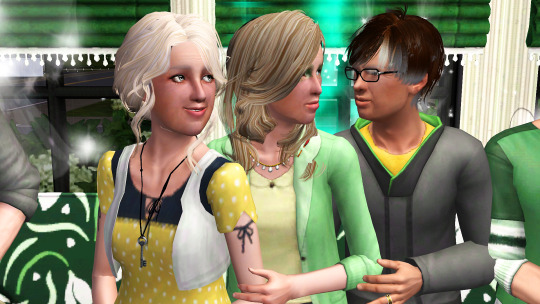

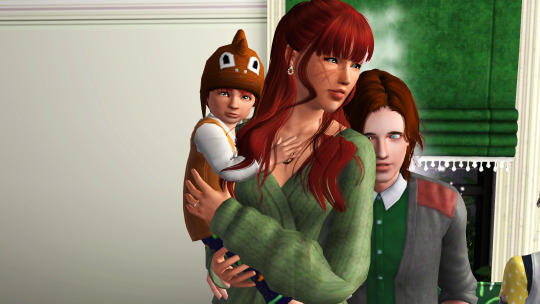
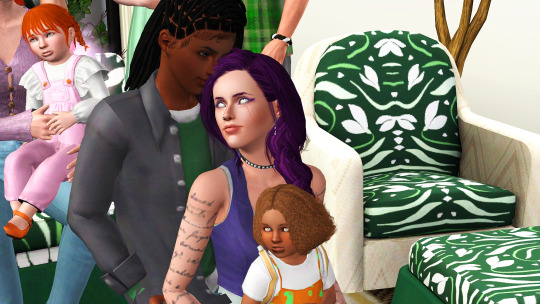
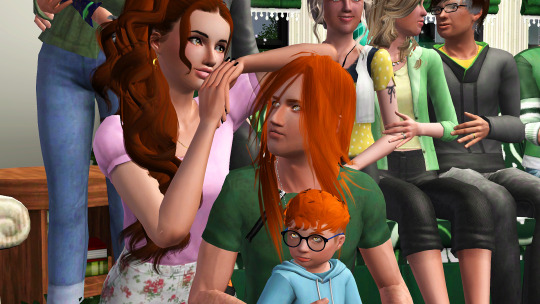
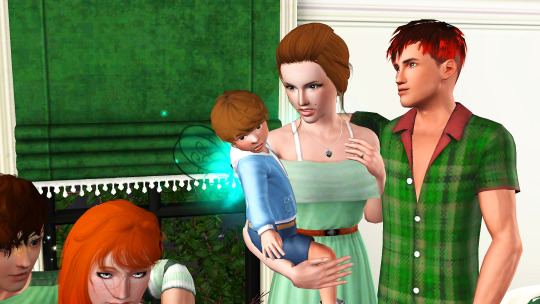
THE PIERCE LEGACY: GENERATION 4/5
Eight years later, here we go again! For everyone that may be around but doesn't remember, or for anyone new who might hop on here, here's the basics of this legacy:
Each generation is focused around a new occult life state. Generation 1 was ghosts, generation 2 was imaginary friends, generation 3 was fairies, generation 4 was werewolves, and generation 5 will be witches. If I manage to stick with it, we'll move onto mermaids, then plantsims, vampires, and the last two gens were still up in the air. Each gen also has a colour, with yellow, green and orange being those of the three surviving generations.
We're going to start off pretty light story wise until the kids are at least children, to see if I can actually get back into it, but then we'll see.
All old posts are still linked on their navigation page, and the summary of the most recent generation's story is specifically here. (Bear in mind it was all written 8-10 years ago, so it's not all very well written and is outright clumsy in places, plus some posts were lost to the censors.)
More details below the cut. (Sorry, this got WAY TL;DR.)
The current family is as follows:
Maylu, Nat and Kain Pierce: Maylu was generation 3's heiress, and is the only non-occult sim left in this family. Nat was her childhood sweetheart, and Kain was another fairy they both met at university. What started as a drunken three-way became asking Kain to help them have kids became a polyamorous relationship.
Alfred and Avery Pierce: Generation 4's heir and spare. 'Twins', of a sort, in that they were born on the same day, even if they're actually half-brothers. Avery is blind in one eye and Alfred has stunted wing growth, both as a result of the same incident in their childhood.
Tessa Pierce (née O'Connell) and Ylva Pierce (née Tate): Generation's 4's spouses! Both werewolves that have rough pasts, as all the wolves do. Tessa and Alfred have been together since they were young teens, Ylva and Avery got together later in their teen years.
Ivory Nein-Russel and Adrian Nein-Russel: Unrelated to the Pierces themselves, but Ivory, Tessa and Ylva are practically sisters. With a little bit of an age gap, Adrian and Ivory fell in love last, but no less deeply, and last we saw they'd just gotten married.
Elanya Pierce, Felan Pierce and Calypso Nein-Russel: Heiress and spares (sort of) of generation 5! Elanya is a fairy, Felan and Calypso are werewolves. Calypso was adopted. They're a bit older than when we last saw them, being treated as more around 3-4 than 1-2.
Then, living elsewhere in town and only here for this picture, there's:
Ella Pierce and Faye Pierce: Spares from generation 4, Ella being Maylu's bio kid and Faye being Nat's, a turned-werewolf and a fairy respectively. Ella grew up a normal sim, but got Dexter to change her when they were teens because she was tired of being the only normal sim. This was more dangerous than expected.
Dexter Pierce (née Richwood) and Obsidian Pierce (née James): Spouses to Ella and Faye, respectively. Both werewolves, who like Adrian were also with the pack since they were kids. Dexter and Adrian have a bit of a rivalry, but they've been working on it.
Xavier Pierce and Cyril Pierce: Cousins to generation 5, Ella and Faye's kids respectively. Xavier is a werewolf and Cyril is a fairy.
I have all sorts of weird random bits of personalised occult lore for this family, but the relevant bits are:
There are very rare instances of occult hunters, and there is, technically, still one out there on the trail of the wolves in this family.
Fairies all start with the tiny little wings that then grow into one of the bigger shapes when they get older. Alfred's were stunted by emotional trauma and never grew.
Fairies can develop something called an adeptnature, which is a talent for a very specific branch of their nature magic. Alfred has one for befriending small animals, Avery has one that lets him sense the weather.
Fairies can have a variety of face markings, like Nat's 'eyeshadow' or the speckles on Alfred and such, that almost always skip a generation.
There are three kinds of werewolves: born wolves, moonborn wolves, and turned-wolves. Tessa, Ylva and Ivory are each of those respectively.
Cottonwood Hills, the town I play in, is a generally very welcoming town for occults but does not believe weresims exist. Maylu is working on proving it so the weres in the family can be open about what they are without issue.
Normal sims cannot learn alchemy. (Obviously they actually can mechanically, but lore wise.)
#the pierce legacy#the sims 3#sims 3#ts3#generation 4#sims 3 legacy#Maylu Pierce#Nat Clifford#Kain Thompson#Alfred Pierce#Avery Pierce#Ella Pierce#Faye Pierce#Tessa O'connell#Ylva Tate#Ivory Nien#Adrian Russel#Obsidian James#Dexter Richwood#Elanya Pierce#Felan Pierce#Calypso Clearwater#Xavier Pierce#Cyril Pierce#pinned#pierce legacy revival
6 notes
·
View notes
Text
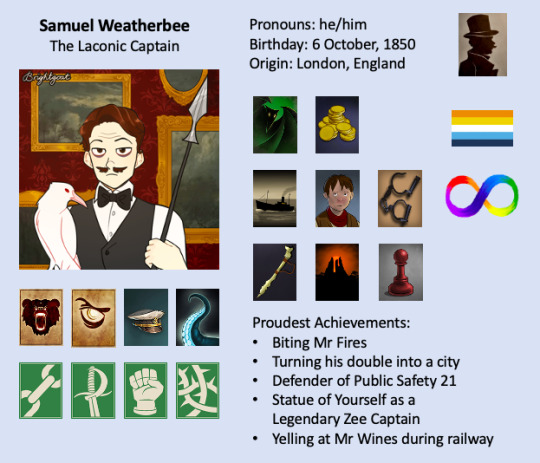
The second of my OC introduction posts is ready! Meet Samuel Weatherbee, the Laconic Captain. The appointed Dad of the friend group, but if you think that makes him more responsible/less chaotic than everyone else, you’d find the opposite to be actually true. Picrew link
Edit: Notes on his past as a zailor and a possible future after playing Irem
Quick Facts:
• Was already orphaned before London fell. Didn’t know his old surname, so the urchin gangs came up with this one for him
• What we’d call in modern language to be semi-verbal. Can’t get two words out of him most of the time [though he is good at letter writing], but he’s the best at his interests: navigating and monster hunting
• Spent much of his life as a zee-captain before retiring to run a modest bar [I had already decided he was a bartender before playing BAL, and I was repeatedly amused by the plots of obtaining rare bottles and interactions with Mr Wines]
• Hasn’t considered himself human in 30 years and isn’t bothered a bit by that fact
• Rumored to be immortal, whether that’s from something he found in his days at zee, a deal with a devil, a deal with a god, or a certain card game. Really, he fears the true death more than almost anything and has taken great measures to avoid it.
• Refuses to phrase any statement as a question. One may ascribe this to his lack of interest in conversation, or one may wonder just how far East he almost went, once
• Not quite religious, but superstitious about Stone, Storm, and Salt
• Since he’s been in the Neath since London fell, he feels he knows it better than most. He generally believes it to be futile to challenge cosmic powers and is happy to spend his days as an NPC running a rest point for others. That is, until he meets “his kids.” [My OC Orsinio as well as a few of my friend’s OCs, and later April]
• Had a bit of a midlife crisis (as much as that means when you can’t die) and wanted to have new stories to tell his young friends, so walked into the Medusa’s Head on a whim one night to begin hunting the Vake. Regrets it immediately and spends most of the ambition wishing he had never left his bar
• The ambition journey made him realize that it is possible for humans to take a stand against cosmic power. He can’t change everything or save everyone, but he can do something about this immediate problem and save someone.
• Yes, yes, putting an end to millennia of senseless violence is well and good, but really, he wanted to fight Veils for flirting with his kids (Paisley sure did happen) and calling him “Sammy”
• Before Bag a Legend, he would walk away from any problem he couldn’t solve. Now, his method is something of, “forceful first, ask questions never”
• Now, he’s officially back on the playing board, making waves in the Neath again rather than flying under the radar. The Masters somewhere heard saying, “Oh no, he’s back” before proceeding to pester him for help with everything. Maybe he’d actually say yes for once if they hadn’t picked up the trend of calling him “Sammy” [The one time he actually speaks for more than a single sentence at once is yelling at Wines during railway. 10/10 funniest moment for that to happen]
• Can be impulsive and stubborn. Because he knows the Neath so well from experience, he feels like his decisions are the right ones, and he struggles to compromise when others have different sources of knowledge and plans
• Exemplifies the adventure hero archetype of period-typical literature. He’s not too interested in lore or power, only the thrill of discovery. Never wonders if he really should be somewhere, only that it’s his right to explore
• Doesn’t have bad intentions, but was indeed raised on Victorian British imperialist propaganda, which I imagine only got worse after London fell. His “kids,” especially Orsinio, help him to unpack some of that and challenge the ideals he was raised on. This will become relevant during Evolution arc
• No matter where London goes, he’ll be there, keeping the home fires burning. He wants to be a sanctuary for everyone with no exception, a protector. It was a spur of the moment choice, but this is the reason he chose to make his double into a city at the end of the railway. Dabbled into the Discordance because what better fit for him than language that revolves around not speaking?
• Plays red with a black lean on the chessboard. Not too fussed about cosmic forces, but he grew up on the streets and spent much of his life working class. And he sees death as something to be conquered, so naturally, he opposes light.
• “A mix of voices” railway ending, he can’t be bothered with strong political opinions [I really wanted to get the perfectly balanced ending but I was ONE off, alas]
#my ocs#fallen london#bal spoilers#railway spoilers#fl spoilers#it's MY ocs and I get to make most of them aspec and autistic#there aren't enough picrews for dilfs and it's a crime#instead of hunter mine it was just ppspsps sammy cmere sammy#funniest of my ocs hands down
28 notes
·
View notes
Text
Fnaf movie spoilers
This is just a post with Thoughts and Opinions™️. You don’t have to agree or disagree I just wanna talk about them.
I love the movie and I loved watching it in cinema, but I do not like Vanessa’s role in the movie. I feel like she was a completely unnecessary addition in spite of how well the cast was. And frankly, Mike’s 1 tie to the plot is flimsy at best as well. He wasn’t really active in trying to find anything out and Vanessa just kinda had to dump all the information on him towards the end.
I have a few proposals to fix the pacing and exposition.
Number 1 is to just get rid of Vanessa. She’s not relevant other than to lore dump (which I find annoying because she actually could’ve been utilised well in a slightly different story). Make Mike more active in uncovering the mystery, hell even use Abby to push him in the right direction.
Number 2. I saw this one theory before the movie came out about Mike still being Michael™️ and William’s son but he along with his sister were put up for adoption years ago. This, I feel, works well too. The whole thing with the Bite of ‘83 happened, leaving Mike so traumatised he repressed his memories and was shortly after put up for adoption. The whole adoption system isn’t great tho, so the moment he was 18 he took himself and his sister and moved out to try and make a life for themselves. “Steve Raglan” recognises Mike and wants him dead bc he’s a serial killer or something. Vanessa’s role here is she’s the one who helps Mike rediscover his past and remember. This makes the triumph over William at the end more personal.
Number 3. Vanessa is not William’s kid and instead became a cop after her sibling was killed in the murders by a mysterious killer that was never found. She’s obsessed with the case because of that and refuses to let it go. She can still be scared shitless of Spring Bonnie because she knows that’s who lured her sibling away and he’s like,, her childhood nightmare that she’s never gotten over.
Number 3 & 1/2: can be part of the previous one, Mike’s brother was killed in the murders also and that also gives Mike more ties to the whole story. It also gives Mike and Vanessa something in common.
(Also as a side note. What the fuck was William doing in Nebraska kidnapping kids from campsites in the woods??) (and also as a personal nitpick ig I would’ve liked a bit more blood and injury. I know that thats a precarious position since fnaf has never been very visceral beyond a few pixilated scenes and that there’s a lot of younger fans, as there always has been, but I feel like a bit more blood, not blood and guts, just blood, would’ve been nice.)
Again, I fucking loved the movie. It was so enjoyable to watch and I’m glad that at the very least we have it. I just enjoy this kind of thing. I like to engage in media this way.
#fnaf#fnaf movie#also i wanted the climax to be longer. and showcase more of that ‘William Afton Genius’#a chase scene or maybe just... a trap or something. it would’ve gone a long way#fnaf spoilers#fnaf movie spoilers
5 notes
·
View notes
Note
I FELL ASLEEP WHOOPS, for three hours jesus i promise i'll get more sleep soon ♡
Yeah Alexis' father is Roman! But she's also dewey's gale's adoptive daughter, she grew up in woodsboro along with Tara. She met Sam through Tara when she was like 10 and Tara made her stayed over her and sam's house. Alexis didn't really have much interaction with Sam when they were kids but they started to know each other, being more close after Sam found out her father was Billy
I don't exactly know how explain Alexis' personality but she's a good and nice person, she cares for the carpenter sisters a lot, she's just a little strange sometimes. She has a different way of thinking/actions in critical situations because she sorta lacked emotions, she's much like Kim Sum from somebody kdrama
Jill actually babysat her when she was younger 💀💀 let's just say Alexis really looked up to her a lot and was devasted about her death.
Alexis' character parallels both Jill and Roman, in some of her moments in her life. She was never the same after dewey's death, she isolated herself from the core four which was unsually, she became more quiet and gloomy in scream 6 but still having a bright personality sorta.
A small thing, her appearance in scream 6 is androgynous looking so she got mistaken as a short and really pretty guy by quinn when they met 😭
Her biological mother's story is actually relevant to her story but i can't tell you that yet 🤫
I am so sorry it took me a hot minute to get to this; i literally posted my latest fic and then went to sleep 😭
I love Alexis’ lore so much!! She sounds like an amazing complex character who’s more of a 3D person compared to a 2D one, if you know what I mean. The lacking emotions trait is an interesting choice, and I kinda it!! It had add some angst to some moments as well! And Jill being her babysitter too! I love that so much!! And not you gatekeeping her biological mother from me 😭 that’s just evil
4 notes
·
View notes
Photo
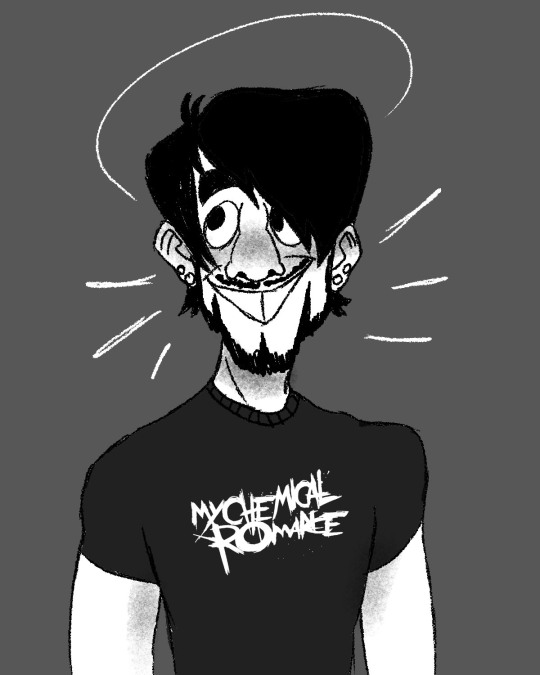
my jackie! lore rundown under the cut:
25-30, trans male (he him), queer, 5’9”
i LOVE HIM
uhhh canon comparisons! there are basically none haha, hes sooo different from jackieboy man. like hes not even a superhero
i mean theres SOME comparisons to the superhero story, its just different.
jackie was born with a backstory, that being somewhat of a simple one. he had a mom and dad and grew up somewhat poor in the outskirts of new york (spiderman reference LOL). he was a rowdy kid but always very kind. he came out as trans when he was 14, and his parents were generally pretty supportive. but, jackies dad ended up passing away from cancer a year later. and jackie was, of course completely heartbroken. but grief wasn’t the only thing he ended up dealing with.
that big event in his life triggered something in his head. now, idk if any of yall remember the Cool Patrol video ninja sex party released some years back, but it basically plays out in a similar way in my canon. jackie is approached by a group of people; danny, bryan, and the other members of the patrol, and convince him that he’s a super hero destined to save the world. and jackie was obviously confused at first, but he believed them wholeheartedly and started doing uhhh “superhero stuff”, aka being very reckless. basically, he ended up missing for a few days, and when the cops found him, he was hours away from home in an abandoned trainyard trying to fight a demon. when he was hospitalized, he finally got diagnosed with Schizophrenia.
so yeah. he spent a lot of his late teens in and out of hospitals, getting stable, and when he was old enough, he started transitioning! and thats really where we “left off” when jackie was “created” and brought into the story.
so besides his schizophrenia, jackie is, without a doubt, the sweetest ego out of everyone. hes literally sooo nice. almost too nice at times, but he just has so much love to give, man. every ego that Jack created, jackie fell in love and wanted to protect and care for them. even though he isn’t actually a superhero with superpowers, it doesn’t make him any less of a hero to characters like Chase, when he puts aside his own needs to make sure other egos are safe and taken care of, especially when anti comes into the picture.
now you may be noticing how im drawing this guy. which is Emo. this man is an emo motherfucker. he loooooves emo culture and really holds onto those early 2000’s for comfort, and its just sorta ingrained in his personality. yes, he loves my chemical romance, and yes he wears a gir hoodie, and yes, he wears band bracelets and sometimes does some eyeliner. and he is VALID
as for his hobbies, he likes doing stuff with computers, playing video games, working out (hes a beefy boy btw, despite having a naturally thin build), and hanging out with chase, who, ill discuss later, is like his best friend in the ENTIRE world.
im still messing around with specifics of the “story,” but i like to think hes the one who hunted down jameson and rescued him from anti. jackie’s actually very smart, and because of his background with technology, he became something of a demon hunter and tracked down anti.
overall, jackie is essential to the plot of my ego lore, or at least the little plot there is, which is why he comes next after jameson in relevance. i really dont know what the other egos would do without him. hes kind, hes funny, hes strong, hes battling a serious psychiatric disorder, and he would die for his friends. and really, thats all thats important when talking about jackie.
9 notes
·
View notes
Text
Großauheim
As draft this post on Sunday March 24th at 1:04am (german time), i can hear my dear friend jena sleeping in the wooden bed i once slept in when i was five. we are staying with my grandparents in Hanau, or more specifically the village on the outskirts of the city called Großauheim. Hanau neighbors Frankfurt in the state of Hessen. it's quiet here.
My dad grew up in Nürnberg, which is a city about 2 hours away from here in the neighboring state of Bayern (Bavaria, in english). I feel very connected to that city and my heritage in that region in part because I actually started first grade there when we lived there for six months while my grandmother Hedda was dying of cancer.
I talk about death quite casually, I hope that isn't bothering anyone too much. I think it's quite relevant quite often, and as someone whose grief has played a pivotal role in my childhood I refuse to shy away from reality, though I do apologize if your own grief makes this hard to read. I know there were times in my life when mine would have.
Anyway back to Bayern; I often tell people Bavaria is the region of Germany where all the german stereotypes come from. Oktoberfest, lederhosen, overflowing beers brought to you in a biergarten by a busty woman in a Dirndl (yea that laced up German dress, see me in one below), bratwurst and big soft pretzels and yodeling and shit are really more closely tied to the Alpine region than Germany itself, and Bavaria includes much of the German Alps. God I love those mountains, and the little huts where you can get a full restaurant meal on the mountaintop after a morning of hiking. Some of my extended family members always wear traditional dress to family events, and I've joined in on that because it's a) so practical to always know what to wear b) so fun! and c) it's the one part of my heritage that I feel like I have any tangible connection to.
I guess I should give a super quick recap of my family lore for those who haven't known me as long or even really at all. My dad is german, whole family still there. He went to college in Glasgow, Scotland where he got married to an American studying there too, had a kid (shoutout Craig), and got divorced. Craig's mama decided to move back to the states for support from her family back home, so my papa decided to move to be nearer to their kid. My parents met on Yahoo Personals when they were both single parents in Cincinnati Ohio. My mama got a tenure-track offer at UMASS Boston, I'm born in my childhood home in Arlington, MA yada yada.
My grandpa moved to Hessen a bit into his relationship with Sabine after Hedda died in 2009. Sabine's family has lived in Großauheim for several generations. She's a doctor and used to hand-make puppets to tell her children stories. My grandparents are exceptionally cute together. They randomly breakout into song and loveeee to infodump about really anything historical whenever possible. jena thinks they're really funny. speaking of jena she has rustled awake a few times and heard my keys clacking. I'll show her this post in the morning. Speaking of morning, I should sleep now. I'll post more about Germany tomorrow.
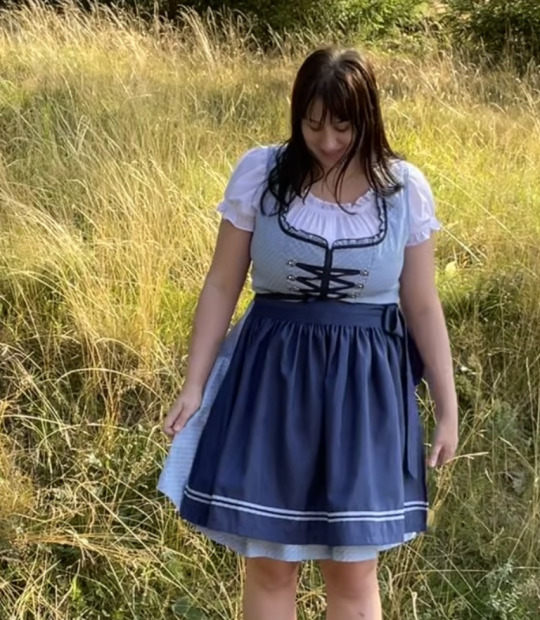

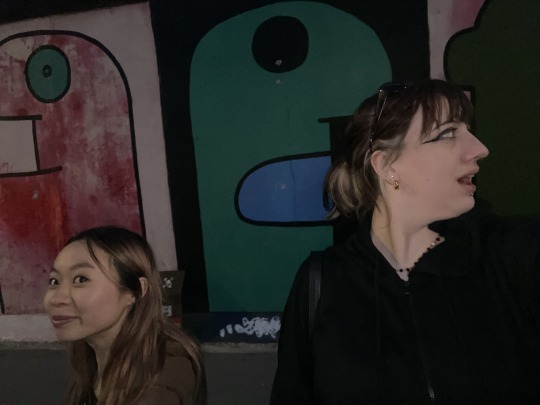

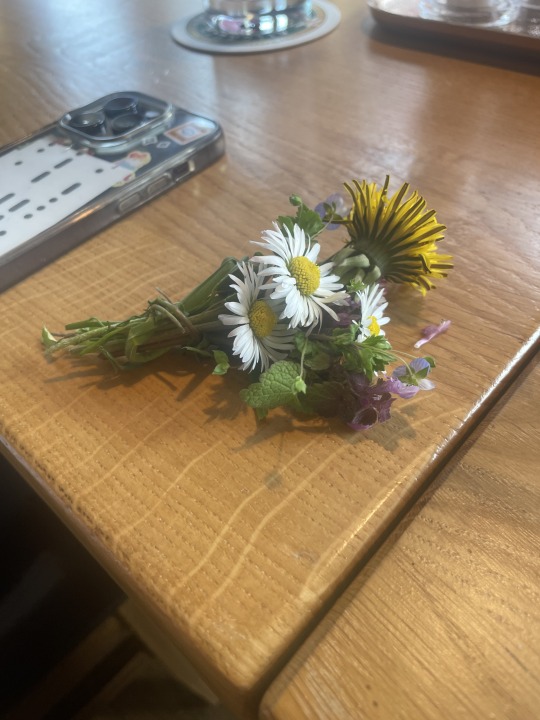
youtube
0 notes
Text
I heard there is a Toy Story 5 in the works. Personally, I don't mind because each movie has a satisfying-ish ending depending on which one. You can stop watching after 3 and still be fine. Who knows if that made sense, but with the 5th installment, it will add more lore to the world which I find interesting. I'm now obsessing over the movies in a way because I heard there was a musical for Toy Story that existed. It was one of the musical shows on the Disney Cruises and some of the songs slapped. (Why We're Here Reprise and Busted are pretty good, sadly there is no official recording of the songs.)
Anyways, Toy Story 5. I heard a theory that it will be Woody reuniting with Andy somehow and I've just been thinking about it. The two really need to reunite because it would be so amazing. Woody finds Andy in whatever plot relevant way and while sneaking around, Andy spots him moving. Andy is confused because what just scittered across the floor? Was it a mouse? He hopes it isn't. Andy slowly approaches the blur he saw and finds his beloved childhood toy, Woody. He picks it up, even more confused on how he got there. He pulls the pull string to hear one of the wondrous lines the voice box provides but nothing played. It must have broke from all of the time apart.
Andy brought Woody towards an office or something to do work or whatever older Andy does. He leaves the room to grab something leaving Woody alone for a short amount of time. Woody uses this opportunity to wander around the room, seeing what his kid is now doing. Coming back, Andy finds his Woody toy standing and staring around the room taking in his knickknacks and pictures. Woody hasn't noticed Andy yet. Andy doesn't reveal he's there yet, instead just watching his toy actively moving on its own.
Woody finally spots him and practically jumps 5 ft (not actually) and goes back to ragdolling. Andy tells Woody that he saw that and no need to be scared or something like that (idk, something mildly sappy but funny). Woody comes back to his more alive self and starts explaining how he is actually sentient and has been there for Andy for who knows how long. Andy, trying not to freak out, asks Woody questions about how he functions and why he never moved when he was around. Woody answered and then asked Andy some questions about what he's now doing in life. They fall into a nice rhythm and catch up on practically everything from Woody's adventures to Andy's current job. They have a nice time of making jokes and telling stories.
Idk, now I just wanna write them just talking. It would be nice.
#un1c0 rambles#toy story#toy story 5#idea#woody the cowboy#andy#i feel like they would get along as best friends#old friends#andy asking woody questions about being a toy#then woody asking andy about his current life#just old friends catching up in a way#then andy brings up how woody and buzz just went missing#woody tells him the whole story#i just want 20 or so minutes of them talking#woody is allowed to break the rules#oh yeah#give the musical a listen#it's pretty cool#a lot of reprises tho#i want to listen to the songs on a streaming service#please give it official audio#toy story the musical
1 note
·
View note
Note
i think one of meyer's biggest problems (i mean aside from the obvious) is that to her, the characters in her book that aren't bella and edward are just set dressing. she doesn't understand that anybody could see esme, for example, as a tragic character whose human life was defined by loss and abuse, because to her, she's just a plot device. she's The Mom, full-stop. jacob's imprinting doesn't register as horrifying because renesbait is the perfect daughter who deserves the perfect happy ending (a doting husband and probably kids), and jacob is just perfect for her! he's big and strong and loyal, and he won't age and die on her! she doesn't seem to get that people could see these characters as anything other than vehicles for bella and edward's story (and renesbait's, down the line). she has exactly one (1) story that she wants to tell, and anything else is just flavor text.
though to be fair, this started as her personal fantasy. when she got a book deal, she then had to go and beef up the story, which i think is where a lot of the worst stuff comes from.
Yeah, pretty much this.
And this is why romance novels and rom-coms that focus on just one couple (vs an ensemble like Love Actually or something), usually have a pretty limited cast because, who cares? The point is the relationship between the two leads, you don't really need or want anything else. Maybe a quirky or sassy friend (Alice) and a rival (Jacob) or some sort of inconvenient girlfriend/fiancee/ex (sort of Tanya? but not really) and that's all you really need. Family might exist for funny meeting-the-parents scenes but you don't need a backstory on the parents. You don't need a backstory on the quirky friend.
But after she invented Edward, she said she couldn't imagine him without a family. He MUST have a sister like Alice. But that's not enough. SM is from a big family, Edward deserves a big family, so then she invents all these other characters to be The Mom and The Father Figure/Mentor, then The Big Brother. Then oops, Quirky Sister and Big Brother need romantic partners, so here comes Mean Sister and The Vampire-y One. And now you have this huge cast with thinly sketched (but interesting!!!) histories that she doesn't plan to actually DO much of anything with, they just exist to be The Family. None of them have a story arc of their own. I mean I guess there's sort of "Rosalie learns to like Bella" but that's still Bella-centric and is more about Bella's fantasy of a perfect forever family. Does Jasper improve his control? Is Alice vicariously living through Bella's human experiences meaningful? Does Carlisle successfully convince others to try vegetarianism? Who knows, who cares, not the point.
And then she just keeps adding more characters! The cast of the Twilight novels is huge; it's like a Harry Potter universe of characters when the storyline is a pretty insular romance. She invents all these fascinating characters who can turn into wolves and then again, doesn't follow through with anything. Does Leah find peace? Do she and Emily mend their friendship? Who is Embry's father? Doesn't matter. Not relevant to Bella's story.
There's the Volturi, who at first to seem to be about world building and lore, but then they just sit on there thrones so much they've started to petrify. They literally don't do anything! And again, to tell this story you maybe need like one leader and one scary weaponized vamp, but we get THREE leaders and a whole bunch of named vampires with different powers who again, never really get to do much of anything. What's the point of the history between Amun and Demetri when it's never mentioned at all?
Then all the visiting vampires. She obviously LOVES Garrett and Benjamin, you can just feel the "aren't these characters SO COOL?!" pulsing through the page. But other than Garrett's big speech [which feels weird because we only just met this guy. Usually a character who had been there since the beginning would have this moment, a moment that we had been building up to for four books. Maybe Carlisle gets to make his final plea for vegetarianism. Maybe Esme, always quiet, always on the sidelines, steps forward and surprises everyone with her defense of her family and their way of life. Maybe Jasper, the one who wasn't totally sold on this diet, who wouldn't have tried it at all if not for his gift basically forcing him to, gives an impassioned speech from the POV of a former human-blood-drinker that appeals to the other vampires better than any of the veggie-from-the-start Cullens could. But no, it's Garrett, whom we met like 50? 100? pages ago, but since we're told he's a Revolutionary, and a Patriot, that's all the weight we need], none of them really matter or do anything. Benjamin could have left Amun in the end and that would have been something, but, no. It's still Bella's shield that gets all the credit for saving the day. It's still her story and her fantasy. And that's fine! Certainly there are plenty of male-centered power fantasies where some average guy turns out to be the chosen one and better at something than the people who have trained for it for years and gets love and power in the end.
It's just weird that the story she wanted to tell was pretty much just Bella and Edward Fall in Love and Get Married and Bella is the Best Vampire and yet she invented all these other characters without giving them any larger purpose. They have backstories that SEEM relevant but never go anywhere. Esme having met Carlisle when she was a human teen never comes up. Carlisle's mother dying in childbirth is never mentioned during the debates over Bella's pregnancy. Emily's scars are clearly supposed to be a warning about the dangers of being involved with supernatural beings, but it's a warning Bella ignores (and that's not even getting into using the suffering of an Indigenous character to teach a white girl a lesson). Leah's dad only died so Edward could be confused about 'the funeral' and think it was Bella's; it's never really brought up otherwise. There's no reason the rest of the pack has to be so crappy to her, it doesn't go anywhere. How much would the main story really change if Edward were the only vampire and Jacob the only wolf? Sure, some plot beats would be different without Alice to predict things, or without the tension between the Sam and Jacob factions in BD, but overall you could tell basically the same story without literally everyone else.
148 notes
·
View notes
Note
...you have opened my eyes to a vast universe of VintageBeef lore that I was unaware of. I knew about the New Hermit Order, of course, and the UHC invention, and I've watched a few of his CTM things but -- I will take all the info and lore you feel like giving out because Beef is amazing and my knowledge is so small.
Vintagebeef my beloved <3
So the thing is, right, until about 2016 I only watched two (2) youtubers- Vintagebeef for Minecraft and aDrive for Pokemon (and funnily enough both of them are named Dan irl). So I've watched most of Beef's videos over the years and have a general knowledge of most of his stuff, except because it's been like a decade I don't remember where most of the lore comes from XD
The thing with him is that he doesn't do Lore tm the way other mcyters often do lore- he doesn't have an extensive RP series to draw from like Grian, doesn't have a solo world with steadily increasing amounts of lore like Etho or Zisteau, and while he's played on SMPs and been involved in storylines before it's not really the focus of his episodes unlike with Evo or Legacy or Empires
So where does that leave us?
IRL, Beef always has multiple series running at the same time. Often he's playing on an smp while doing a singleplayer, often modded, series as well as a CTM or modpack with a group of friends. For example, right now he's playing on Hermitcraft, doing weekly Pixelmon and Building a Zoo episodes, and a CTM map with Slip. And to me, this translates to one thing: Beef is an adventurer. He travels frequently- he explores a world and when he decides he's done, he leaves for the next one. That's the basis of my personal interpretation of his series and his character for my writing.
Ok so reading this back, this got extremely long and didn't explain much in the way of lore, somehow? If anyone has any additions to add please do so, I am very definitely leaving out a lot and would love to see what other lore people remember and are using for Beef! I didn’t include the Hermitcraft stuff since my memory of season 4 is blurry (his base was themed after the Martian, that much I know, and he and Iskall were buddies :D) and most of the s5 NHO lore is best watched from Bdub’s perspective from what I remember, and the only s6 stuff is a single line in Hermitgang and then the Area 77 arc with its possibility of an NHO reunion which we did not get rip. And s7 of course had the cloning machine and also the Podzol Party as the main lore. So all the original rambling is still below the cut though it is very long, and I'm gonna bullet point the main stuff here instead:
Actual canonical things:
Invented UHC and was the only survivor of the first ever uhc (Mindcrack UHC s1)
Married to an ender dragon (one of the UHCs I think), later father to a different dragon (Mindcrack season 3? I think?)
Might not have legs if you choose to take that joke as canon (Mindcrack s2)
Was a wizard (RAD)
is a zookeeper (Building a Zoo)
Had a wife and kids (Sims in Minecraft)
Part of the Trial of the B Team court case (Mindcrack)
NHO founder, founder of the Podzol Party (Hermitcraft)
Created a cloning machine that sort of works (Hermitcraft)
Played the Forest which is I believe the first time he and Keralis played together (look up the trigger warnings for this one, it's a horror game)
Was the creator/owner of Sourceblock SMP (featuring some familiar faces if you know Legacy, Empires, or MCC) and there is literal magic from a mysterious sourceblock of water that teleports people and summons mobs and probably more stuff that I haven't seen yet since I'm still watching it myself
Things you can infer:
Good with animals (Life in the Woods, Pixelmon, Ark)
Is a car nerd (irl and all of the car games he's played)
Is a highly experienced adventurer who has traveled through dozens of worlds both vanilla and modded, across multiple dimensions (Twilight Forest, the Aether, the Betweenlands, Limbo), completed dozens of monuments, fought in blood sports, survived apocalypse after apocalypse, tamed dinosaurs, and played a lot of prop hunt and golf with your friends
If you're looking for what to watch for lore purposes, I'd say the Mindcrack UHCs and Team Canada's RAD series are pretty good, definitely Sourceblock and HC s5, plus the Diversity CTM maps and Ruins of the Mindcrackers maybe? And Mindcrack Prank Wars for the chaos and the origin of Team Canada. And if you can handle horror than the Forest is fun and if you don't do horror you can watch the Pojkband play golf or prop hunt they're hilarious I love them sm I want a Pojkband reunion So Bad
Beef's first series was a singleplayer series in beta 1.4_01 though he had played the game extensively before that, and was a big fan of Guude, having watched his own Minecraft videos. The series was functionally a hardcore one where if he died Beef would delete the world and start again! I haven't actually Watched this series so idk if he died or how often lmao. When Guude made Mindcrack, which was btw one of the very first Minecraft SMPs, he also hosted a competition for people to join, and Beef submitted a video (which is still viewable on his channel I believe!) and won, and was added to Mindcrack in season 2 :D (fun fact, Guude said that even if Beef hadn’t won he would have added him anyway)
Two running jokes emerged from Mindcrack- pulling a Vintagebeef and Beef doesn't have legs. The first is a reference to Beef dying of fall damage (I believe the exact instance was him trying to jump into his swimming pool and failing spectacularly) and after the incident, every time someone died of fall damage they were pulling a Vintagebeef. The second joke comes from Guude, who joked that the reason Beef wasn't going to a convention was because he didn't have legs, and then he pranked Beef's base by building a giant pair of legs at the entrance to his castle so you had to walk between them to get into the base. This joke has long since died and both Beef and Guude feel pretty bad about it iirc because there were people who genuinely thought Beef was disabled and were emailing him supportive messages and stuff oops. So if you go looking on the Salad or find old Mindcrack fics, you might see references to Beef having prosthetic legs!
Mindcrack also brought about the creation of several Player groups- Team Nancy Drew, Team Canada, and GOB to name a few relevant to Beef. Team Nancy Drew consists of Beef, Pauseunpause, Guude, and Baj, who formed to investigate a prank on one of the members but I forget who. They're named Nancy Drew after the detective! Team Canada also formed in retaliation to pranks, with it consisting of Beef, Etho, and Pause, the three Canadian members on the server (not including Adlington who moved to Canada but never joined the group). There was also a Team America who pranked them with American flags everywhere. GOB is Guude, OMGChad, and Beef, who played stuff like the Ragecraft, Pantheon, and Monstrosity ctms together but that's way down the line lol
Team Nancy Drew is also notable for inventing UHC. It was Beef's brainchild but it was the four of them who first played it! The first UHC had the four of them working to kill the dragon with no natural regen, with everyone dying but Beef, who "won" the UHC. The second uhc was still dragon focused and iirc is where Beef married the dragon? Memories are hazy but they do kill the dragon in this one I think. UHC was then revamped as a pvp event and became a regular Mindcrack game every few months, featuring most of the Mindcrackers and several special guests, including Dinnerbone, who as we know Thanos-snapped Doc's arm out of existence as a result of Doc killing him in one of them
In one of the seasons of Mindcrack, Beef invited swedish Mindcracker and good friend Anderzel to go caving with him and invented ABBA Rules caving, where the winner takes it all. ABBA Rules is a game where each ore (and also dungeon loot like nametags) is assigned a point value and the person with the most points at the end wins and gets to keep all the stuff collected from the game.
In Mindcrack season 3?, Beef punched the ender dragon in an... awkward area, so when the dragon died and left the egg behind, Guude said Beef was the father of the egg XD I don't remember if I watched s3 so I have no idea if anything Happened with this concept but *history of the world voice* you could make lore out of this!
So Team Canada has played a Lot of CTM maps (which fun fact were pretty much invented by another Mindcrack member, Vechs, with his Super Hostile series! Super Hostile has a bunch of things called "Zistonian", which are references to another Mindcrack member Zisteau, who has a very wild singleplayer series with even wilder lore but I digress). In Ruins of the Mindcrackers, they had a running joke that Beef was Etho and Pause's mom, which is a joke we can leave in the past actually /lh. They also played all the Diversity maps, Sky Factory, Terra Restore, Uncharted Territory uhhh and a couple more ctms and adventure maps! Each map kinda has its own story so in Diversity 3 for example they were trapped in a simulation? I think? Team Canada also recently played the Roguelike Adventures and Dungeons modpack, aka RAD, in which Beef was a wizard with a magic staff that could do anything from summon lightning to control hostile mobs.
Sourceblock SMP is a vanilla survival 1.14 series that ran for one season and the series starts with each of the Players being drawn to a strange sparkling water source that, once they touch it, brings them to the Sourceblock world. It also summons a giant zombie at one point. There's probably more lore for this series but like I said I haven't watched it all the way through yet
He has a Patreon server called VintageCraft and has done a series or two on there as well, and played a few UHCs with them, so lore that how you will!
Beef also played a few popular mods, notably Pixelmon, Life in the Woods, and Feed the Beast, with LitW being singleplayer and the other multiplayer. He's also recently played the Zoo and Wild Animals mod a lot. He did a short series with the Minecraft Comes Alive mod where he married one of the villagers and had two children, so that's canon now :D he’s played a Lot of Pixelmon starting when the mod first came out iirc (he chose Turtwig in his first series and built a Grass gym, then made a Normal gym in another series in uhh 2016) and he still plays to this day. Quite a few Hermits played on his Pixelmon servers with him, like Wels, Etho, Iskall, Stress, Slip, Zueljin, and also Guude and Phedran (a Mindcrack adjacent player and creator of the LitW modpack) and a few Mindcrackers on the older servers
Mindcrack and friends played a lot of other games too- 7 Days to Die, Ark Survival Evolved, Unturned, to name a few, so you can pull a lot of lore out of these as well. Speaking of friends and non-Minecraft games, Beef teamed up with Pause, Keralis, and Slip (a former Hermit) to play the horror game the Forest, which saw them stuck on an island trying to survive against terrifying mutated human... things. They played it a few times as the game updated but as afaik it's the first time Beef played with Keralis and possibly Slip and since the game starts with the Player's airplane crashing, that could totally be how Beef first met them in-universe
I... think? that’s everything I mentioned in the tags? There is probably way more stuff I’ve forgotten that stems from inside jokes and things that happen within each series, but I hope that was a) helpful and b) at least somewhat comprehensible lmao
#hermitcraft#mindcrack#vintagebeef#mcyt#long post#asks#redwinterrises#that was so many words#kudos to anyone who reads the whole thing lmao
208 notes
·
View notes
Text
Edward Cullen: That Boy Ain’t Right
So I was doing a reread of @therealvinelle 's collection of Twilight metas, as one does, and in "Edward, Denial, and a Human Girlfriend" she mentions that she doesn't believe Edward is sane. I thought, "ha, yeah, he's definitely not," and also, "but wait, what does that mean exactly, please say more about that." But since she's already inundated with asks, I've decided to use my own head-muscle and explore this idea. (TL;DR: I start out more or less organized, synthesize some points Vinelle has made across several posts (and have hopefully linked to them all where relevant but please tell me if not), touch a little on narcissism, then take a hard left into the negative effects of being a telepath.)
Just a couple things to note at the outset, though. Theses have been written already (probably) about Edward as an abuser. Edward being insane doesn't negate that at all; he's definitely an asshole and just...a disaster of a human being. (I find it more funny than anything, but YMMV.) I'm also going to try to avoid talking specifically about mental illness and how it relates (or doesn't relate) to abusive behavior -- that's territory I'm not really equipped to discuss, like at all. My starting point is "Edward has a deeply warped perception of reality," not "Edward has X disorder."
So: deeply warped perception of reality. The evidence? Goes behind a cut, because my one character trait is Verbose.
Vinelle provides a great example of it in the post linked above, which I'll just quote because she does words good: "[Edward] keeps acting like his romance with Bella is a romantic tragedy, and all the cast of Twilight are actors on a stage making it as sublime as possible." Edward's the one to pursue Bella, but he does so with the full belief, from the very beginning, that it will never last; Bella will "outgrow" him, go on her human way, and he can spend the rest of eternity brooding magnificently over his too-short romantic bliss. [Insert premature ejaculation joke.] Turning her is never an option, even though Alice, Noted Psychic, says that romancing Bella will either end with her dead (exsanguinated) or dead (vampire).
This framing, where he's a dark anti-hero in love with -- but never tainting! -- the pure maiden and eventually leaving her in a grand, tragic sacrifice to preserve her soul? It's fucking bonkers. Bella isn't a person to him in this scenario. As Vinelle points out, Bella's never really a person to him at all; he falls in love with his own mental construct, cherry-picking from what he observes of her behavior and her responses to his 20 (thousand) Questions to convince himself that she is the ideal woman.
Bella's not the only one who gets the projection/cardboard-cutout treatment. Edward sees everything and everyone through a highly particular, personalized lens. He filters his entire reality, which we all do to an extent, but the thing with Edward is that he starts with his conclusions and then only pays attention to the evidence that supports those conclusions. Often that evidence consists of what he admits in New Moon are only "surface" thoughts -- but recognizing that limitation doesn't keep him from taking those thoughts as representative of what people are. Edward then becomes absolutely convinced by his own "reasoning" and won't be swayed from what he has decided is Objectively True. It's obvious with Bella; it's also painfully obvious with Rosalie. (Vinelle explains this and brings up Edward's raging Madonna/Whore complex in the same post, so refer to that again -- she's right.)
He also catastrophizes. Everything. Bella's just vibing in her room, rereading Wuthering Heights for the 87th time? She's gonna be hit by a meteor, better sneak into her room while she sleeps. Bella's going to the beach with the filthy mundanes their human classmates? She's gonna fall in the ocean. Jasper's cannibal pals are stopping by for a visit, but know not to hunt in the area? DISASTER, DEFCON 1, ALSO FUCK YOU JASPER FOR EVEN EXISTING IN MY AND BELLA'S SPHERE YOU UNSPEAKABLE BURDEN. Edward must believe that Bella is vulnerable and in near-constant peril, to support the reality he has created in which he is the villain turned protector and maybe?? hero??? (!!!) for his beloved. So when the actual, James-shaped danger arrives, he goes berserk, snarling and flipping his shit and generally not helping the situation. His fantasy demands that Bella remain human, so instead of doing the very thing Alice, Noted Psychic, assures him will neutralize the threat (and not just a threat to Bella, either, but to Bella's family and any other human James might decide to include in the "game"), he vetoes it immediately, no discussion. Bella Must Not Turn, and he sticks to those guns despite James nearly reducing her to ground beef, despite leaving Bella catatonic with depression (but human! success!) in New Moon, despite Aro's order and his family's vote and, let's not forget, Bella's clearly and repeatedly stated desire to be a vampire. It's going to happen. But he doesn't accept it until Renesmee busts out of Bella like the Kool-Aid man and the poor girl's heart finally, unequivocally stops.
Sane people don't behave this way. I don't want to slap labels on Edward, but I can't help but note that he comes across as highly narcissistic. He's the only real person in his universe, the lone player among us NPCs. That probably has a lot to do with him being frozen in the mindset and maturity of a seventeen-year-old boy, but I think it's also just...him, on some fundamental level. His failure to connect with others and recognize them as full, independent beings with their own wants and priorities isn't like Bella's failure -- she's badly depressed. Edward is...something else, and I get the sense that his sanity has been steadily deteriorating over time. And a cursory google of narcissistic traits turns up some familiar-looking stuff. He's self-loathing, yes, but also grandiose; he hates himself for the monster he is (and hates most vampires besides Esme and Carlisle for their monstrosity, too) but still feels superior to humans, to the extent that he felt entitled to human blood and resented Carlisle for depriving him of his "proper" diet. He eventually returns to Carlisle, but he's far from content -- the beginning of Midnight Sun finds him in a state of ennui, bored and dismissive of (if not outright disgusted by) everyone around him, that has apparently persisted for years and years. He doesn't play the piano, he doesn't compose, he doesn't enjoy anything...at least until Bella comes along and then he becomes obsessed to a disturbing degree with her and his new, romantic tragedy spin on reality.
[Next-day edit: I’m not sure where else to fit this in, but the way Edward casually contemplates violence against people who have, at best, mildly annoyed him is...chilling. I have a hard time writing off his strategizing how to murder the entire Biology class as a result of bloodlust -- it’s so calculated, nothing like the blackout state of thirst Emmett describes when he encountered his own “singer,” and that is probably the default for when a vampire is extremely thirsty. But even ignoring the Biology class incident, Edward still does things like consider, with disturbing frequency, how he might grievously injure or kill Mike Newton, all because...Edward considers him his romantic rival (despite Bella barely giving the kid the time of day). He thinks about slapping Mike through a wall, which might be an amusing slapstick image, except as a vampire Edward’s actually capable of turning this boy’s skeleton to a fine powder. So it’s, y’know, kind of sick when you think about it.
But even worse than that, when Bella tells Edward about how she flirted with Jacob to get at that sweet, sweet vampire lore, Edward chuckles and then, after dropping Bella home, flippantly observes that now that the treaty’s broken, why not genocide? I’m not even kidding, it’s right there in Midnight Sun; he seriously thinks about the fact that he’d be technically justified now in wiping out the entire tribe because a teenager tried to impress a girl with a spooky story. That is fucked. Remember, Edward was there with Carlisle when the treaty was first established. He knows how remarkable it is that they even came to a truce in the first place, that it was only ever possible because Carlisle is...well, Carlisle, and that it marks a pretty significant moment in supernatural history. He doesn’t care; he doesn’t respect it, or he’d never think something like “Ha ha, if I went and killed them all, I wouldn’t even be wrong. I mean, I won’t do it, but I’m just saying, I wouldn’t be wrong.”
Again: not the thought process or behavior of a sane person. (Or a person that respects life in general -- sorry Carlisle, big L.)]
Finally, whether he's a narcissist or not, I think the fact that Edward has constant, unavoidable access to everyone's thoughts is a powerful contributing factor to his instability. He can tune out the mental noise to an extent, but he can't stop it -- so he comes to rely on it like another sense. This causes issues with disconnect and lack of empathy, of course, but there's another facet to this shit diamond: he's basically experiencing a ceaseless flow of intrusive thoughts. His narration in Midnight Sun suggests that he "hears" the words people think, can "see" what they visualize in their mind's eye, and can sense the emotional "tone" and intensity of their thoughts. Therefore, perceiving Jasper's thirst through his thoughts makes Edward more aware of his own, "doubling" the discomfort. This would be a lot to deal with even from just his immediate coven members, but Edward gets all of this pouring into his head like a firehose on a day-to-day basis because the Cullens live right alongside humans. I know Meyerpires have galaxy brains or whatever, but that's a ton to process.
Besides the compounding effect on his own thirst when he "feels" the thirst of others, Meyer never suggests that Edward has difficulty separating his own thoughts from other people's; even when he was newly turned, he recognized Carlisle's "voice" in his head as Carlisle's. That would create a whole different host of issues around identity, but it looks like Edward's escaped that particular torment. However, I can easily imagine that what he does experience is just shy of unbearable nonetheless, with an eroding effect on his sanity over decades. He can't sleep to escape it; he's on a dishwater diet and probably (like the rest of his family) experiencing a perpetual, low-grade physical discomfort due to his thirst never being fully satisfied; and he's around far more people than is the norm for vampires -- even discounting all the humans, his own coven is unusually large -- meaning more noise.
Honestly, it would be weirder if he were all there, considering.
And even though I feel like I lost a sense of structure around where I started ranting about telepathy, I've written like 1.5k words about Edward fucking Cullen and I think that's enough for one post.
#twilight#twilight renaissance#twilight meta#edward cullen#i stared too long and the twilight abyss gazed back#long post#major credit due to therealvinelle for having basically all the ideas already#theoriginalcarnivorousmuffin too since they agree and build off each other's metas a lot#idk how people who write meta can just crank these posts out i've been here for two hours#edited to add stuff i forgot to mention about edward's disproportionately violent fantasies
318 notes
·
View notes